#that makes them an aspect of the narrative that is told
Note
Been a fan of your fics for YEARS. I was just telling my friend how despite how much I read fics I never actually love them, with some of your fics (especially TMA) as the exception. Felt the need to reread some of them and saw you reblogged some ISAT fanart. So. Any thoughts on ISAT you'd like to share?
Hope you have a wonderful day!! So happy I found your fics again!!
I avoided answering this for a while because I was trying to think of a way to cohesively and coherently vocalize my thoughts on In Stars and Time. I have given up because I don't want to hold everybody here all day and I have accepted that my thoughts are just pterodactyl screeching.
I love it so much. I have so much to say on it. It drove me bonkers for like a week straight. I have AUs. It's absolute Megbait. They're just a little Snufkin and they're having the worst experience of anybody's life. Ludonarratives my fucking beloved.
I am going to talk about the prologue.
The prologue is such a fascinating experience. You crack open the game and immediately begin checking off all of the little genre boxes: mage, warrior, researcher, you're the rogue...some little kid who's there for some reason...alright, you know the score. You're in yet another indie Earthbound RPG, these are your generic characters, let's get the ball rolling.
Except then you realize that these characters are people. You feel instantly how you've entered the game at its last dungeon, at the end of the adventure. They have their own in-jokes, histories, backgrounds, adventures. They get along well and they're obviously close, but not in a twee or unrealistic way. They have so much chemistry and spirit and life. I fell in love with them so quickly.
But Sif doesn't. Sif kind of hates them, because they will not stop saying the same damn thing. They walk the same paths, do the same things, make the same jokes, expect Sif to say the same lines. They keep referencing a Sif we do not see, with jokes we never see him make and heroic personality he never shows - they reference a Sif who is dead - and Sif can't handle that, so he kills them too.
They become only an exercise in tedious frustration. Sif button mashes through their dialogue, Sif mindlessly clicks the same dialogue options, Sif skips through the tutorial, Sif blows through the puzzles. Sif turns their world into a video game. Sif is playing a generic RPG. Sif forgets their names. They are no longer people with in-jokes, histories, backgrounds, adventures. They're the mage, the warrior, the researcher, and...some random kid.
I did not understand the Kid's presence at first. I had no idea what they contributed to the game. They didn't do anything. As a party member in a video game, they're a bit useless. Why is the Kid there?
Because Sif's life isn't a video game. Because the kid isn't 'the kid'. They're Bonnie. Bonnie, who the party loves. Why is Bonnie there? Because they love them. There is no room for Bonnie in the boring RPG that Sif is playing. And then you realize that Sif is wrong, and that they've lost something extremely important, and that they'll never escape without it.
Watching the prologue before watching ISAT gave ISAT the most unique air of dread and horror, because you crack open ISAT and you see the person Sif used to be. You realize that Sif used to be a person. Sif used to be the person who made jokes, who gave real smiles, who interacted with the world as if they are a part of it. And you know you are sitting down to watch Sif lose everything that made them a person, to lose everything that made them a member of this world, and turn them into a character in a video game who doesn't understand the point of Bonnie at all.
At the climax of the game, when the others realize that something is deeply wrong and that Sif physically cannot tell them, they realize that there is nothing they can do. So Bonnie declares snacktime. And for the first time they have snacktime.
What is snacktime? Classic JRPGs don't have snacktime. There's literally no point to a snacktime - not in a video game, and not in Sif's terrible life. It's not fixing this, because nothing can fix this. But Bonnie gives Sif a cookie and Sif eats it.
It's meaningless. It's a cutscene. It didn't save Sif and it didn't change a thing. It will make no difference in the end.
But it did make the difference. It made all of the difference in the world. Bonnie is a character who you really don't understand the point of before you realize that Bonnie was the entire point.
ISAT is about comfort media. Why do we play the same video games over and over again? Why do we avoid watching the finale of our favorite shows? What is truly comforting: a story with no conflict, or a story where you always know what is about to happen? Do you want to live in a scary, uncontrollable world, or do you want to play Stardew Valley? Do you want a person or a character?
When I beat Earthbound for the first time (and if you don't know, the prologue/ISAT battle system is just Mother) and watched the ending cutscene where the characters part ways and say goodbye...I felt a little bit sad. I wanted them to be together forever. But that's something only characters could ever be.
#these aren't deep or unique thoughts they're just the specific aspect of ISAT that made it one of the most interesting gaming experiences#i actually like the prologue much more than ISAT for just this reason#its honestly a video game art piece that's created to give the player a very specific experience#that makes them an aspect of the narrative that is told#it's. incredible.#in stars and time#start again start again start again#start again: a prologue#isat#god and there is so so so so much more to say here#what a rich and complex and fascinating game that made me cry like a baby#i dont even kin sif. we arent similar at all.#i cant imagine how devastating this game would have been if i did#but I do have a deep relationship with escapsim#and i write about it a lot#and video games about being video games are wonderful#as are stories about being stories#and why we consume stories. how we use them. how they save us and hurt us.#never played a video game that used its medium so well#i bet undertales also pretty good at that but this is more so i think#stories about stories have to be about why we love stories#and im not an artsy person and i roll my eyes a bit when people talk about the spiritual neccesity of art#i think people need stories because the world is sad and hard and boring and we want to think about something else for a while.#some people need to be anywhere but here#and sometimes if you're Lil Depressed-Ass Snufkin that looks like being here forever#baby cringe-ass snufkin big hat idiot
51 notes
·
View notes
Text
“Claude in Hopes is exactly the same way he is in Houses! He’s always been like that and has the same feelings/morals!”
Claude in GW/Hopes:

Claude, literally, in Houses:

Let that speak for the fact that Claude was written with a 180 characterization in Hopes.
Claude wants peace and to bring everyone together; not to tear them further apart. That is his character.
#I’m still in the middle of answering this ask I got but yeah#even Edelgard noticed Claude really loves bringing ppl together in WC#when she says ''you really value that sort of thing don't you'' after the Eagle/Lion (+Deer >.> ) battle#like if Claude's goal was to destroy Fodlan and just leave a mess of it A+++ you did an astounding show stopping brilliantly done job#if your goal was peace well you fucked that up pretty good buddy#in Hopes too like he's literally arguing with Lorenz about it while Lorenz is like ??? bruh wtf ???#literally who cares what some politicians did 300 years ago certainly not Houses Claude#in fact Claude said fuck our history sideways with a cactus let's make peace and be friends#AND he got the approval from the whole roundtable and that's all we know on the topic bc it's all we needed to know#versus in GW where it's explicitly stated that it took some doing for them to allow Claude to be king#meaning the roundtable was not up for what he was suggesting and needed to be convinced#they needed it enough that Lorenz pointed it out to everyone and from a narrative standpoint#AM Claude doesn't need to say how the meeting went and all we need to know is that it worked out#but in GW it's told to us that the meeting was very long and it took some doing for them to trust Claude's judgment#the meeting is presented in a more uncertain light with how the lords felt abt it whereas in AM#it's not told to us how things went bc it's not important. a negative aspect (i.e. the roundtable not being able to come to an agreement)#is an important thing to note and if there was any negative aspect of it in AM they would've put it in there#meaning the roundtable trusts AM Claude's judgment enough when he tells them he wants to put their two nations together again#idk how else to explain that so I hope you get what I mean lol#I just find it completely baffling that people actually say both Claudes are the same person and that he was always like how he is in Hopes#like you can like his character in Hopes and enjoy that portrayal of him but at least admit he's written differently you know?#I hate when I see people say that Claude fans didn't understand his character in Houses at all bc they don't like him in Hopes#when you have literal staunch polar opposite sentences coming out of his mouth in these two scenes#the Claude we get in AM is the same Claude - the same person at his core - as he is in VW and all the routes#Houses Claude does not blame whatever the fuck Leicester and Faerghus did 300 years ago on the people living in their present#he also doesn't blame Dimitri or anyone else presently in power for Daphnel#GW Claude there is just grasping at unimportant and insignificant straws to justify his invasion#pretty sure AM Claude would be like ''hey dimi lemme borrow failnaught back real quick'' and smack GW Claude with it#then kindly hand it back to Dimi and smile and wave
453 notes
·
View notes
Text
I get variations on this comment on my post about history misinformation all the time: "why does it matter?" Why does it matter that people believe falsehoods about history? Why does it matter if people spread history misinformation? Why does it matter if people on tumblr believe that those bronze dodecahedra were used for knitting, or that Persephone had a daughter named Mespyrian? It's not the kind of misinformation that actually hurts people, like anti-vaxx propaganda or climate change denial. It doesn't hurt anyone to believe something false about the past.
Which, one, thanks for letting me know on my post that you think my job doesn't matter and what I do is pointless, if it doesn't really matter if we know the truth or make up lies about history because lies don't hurt anyone. But two, there are lots of reasons that it matters.
It encourages us to distrust historians when they talk about other aspects of history. You might think it's harmless to believe that Pharaoh Hatshepsut was trans. It's less harmless when you're espousing that the Holocaust wasn't really about Jews because the Nazis "came for trans people first." You might think it's harmless to believe that the French royalty of Versailles pooped and urinated on the floor of the palace all the time, because they were asshole rich people anyway, who cares, we hate the rich here; it's rather less harmless when you decide that the USSR was the communist ideal and Good, Actually, and that reports of its genocidal oppression are actually lies.
It encourages anti-intellectualism in other areas of scholarship. Deciding based on your own gut that the experts don't know what they're talking about and are either too stupid to realize the truth, or maliciously hiding the truth, is how you get to anti-vaxxers and climate change denial. It is also how you come to discount housing-first solutions for homelessness or the idea that long-term sustained weight loss is both biologically unlikely and health-wise unnecessary for the majority of fat people - because they conflict with what you feel should be true. Believing what you want to be true about history, because you want to believe it, and discounting fact-based corrections because you don't want them to be true, can then bleed over into how you approach other sociological and scientific topics.
How we think about history informs how we think about the present. A lot of people want certain things to be true - this famous person from history was gay or trans, this sexist story was actually feminist in its origin - because we want proof that gay people, trans people, and women deserve to be respected, and this gives evidence to prove we once were and deserve to be. But let me tell you a different story: on Thanksgiving of 2016, I was at a family friend's house and listening to their drunk conservative relative rant, and he told me, confidently, that the Roman Empire fell because they instituted universal healthcare, which was proof that Obama was destroying America. Of course that's nonsense. But projecting what we think is true about the world back onto history, and then using that as recursive proof that that is how the world is... is shoddy scholarship, and gets used for topics you don't agree with just as much as the ones you do. We should not be encouraging this, because our politics should be informed by the truth and material reality, not how we wish the past proved us right.
It frequently reinforces "Good vs. Bad" dichotomies that are at best unhelpful and at worst victim-blaming. A very common thread of historical misinformation on tumblr is about the innocence or benevolence of oppressed groups, slandered by oppressors who were far worse. This very frequently has truth to it - but makes the lies hard to separate out. It often simplifies the narrative, and implies that the reason that colonialism and oppression were bad was because the victims were Good and didn't deserve it... not because colonialism and oppression are bad. You see this sometimes with radical feminist mother goddess Neolithic feminist utopia stuff, but you also see it a lot regarding Native American and African history. I have seen people earnestly argue that Aztecs did not practice human sacrifice, that that was a lie made up by the Spanish to slander them. That is not true. Human sacrifice was part of Aztec, Maya, and many Central American war/religious practices. They are significantly more complex than often presented, and came from a captive-based system of warfare that significantly reduced the number of people who got killed in war compared to European styles of war that primarily killed people on the battlefield rather than taking them captive for sacrifice... but the human sacrifice was real and did happen. This can often come off with the implications of a 'noble savage' or an 'innocent victim' that implies that the bad things the Spanish conquistadors did were bad because the victims were innocent or good. This is a very easy trap to fall into; if the victims were good, they didn't deserve it. Right? This logic is dangerous when you are presented with a person or group who did something bad... you're caught in a bind. Did they deserve their injustice or oppression because they did something bad? This kind of logic drives a lot of transphobia, homophobia, racism, and defenses of Kyle Rittenhouse today. The answer to a colonialist logic of "The Aztecs deserved to be conquered because they did human sacrifice and that's bad" is not "The Aztecs didn't do human sacrifice actually, that's just Spanish propaganda" (which is a lie) it should be "We Americans do human sacrifice all the god damn time with our forever wars in the Middle East, we just don't call it that. We use bullets and bombs rather than obsidian knives but we kill way, way more people in the name of our country. What does that make us? Maybe genocide is not okay regardless of if you think the people are weird and scary." It becomes hard to square your ethics of the Innocent Victim and Lying Perpetrator when you see real, complicated, individual-level and group-level interactions, where no group is made up of members who are all completely pure and good, and they don't deserve to be oppressed anyway.
It makes you an unwitting tool of the oppressor. The favorite, favorite allegation transphobes level at trans people, and conservatives at queer people, is that we're lying to push the Gay Agenda. We're liars or deluded fools. If you say something about queer or trans history that's easy to debunk as false, you have permanently hurt your credibility - and the cause of queer history. It makes you easy to write off as a liar or a deluded fool who needs misinformation to make your case. If you say Louisa May Alcott was trans, that's easy to counter with "there is literally no evidence of that, and lots of evidence that she was fine being a woman," and instantly tanks your credibility going forward, so when you then say James Barry was trans and push back against a novel or biopic that treats James Barry as a woman, you get "you don't know what you're talking about, didn't you say Louisa May Alcott was trans too?" TERFs love to call trans people liars - do not hand them ammunition, not even a single bullet. Make sure you can back up what you say with facts and evidence. This is true of homophobes, of racists, of sexists. Be confident of your facts, and have facts to give to the hopeful and questioning learners who you are relating this story to, or the bigots who you are telling off, because misinformation can only hurt you and your cause.
It makes the queer, female, POC, or other marginalized listeners hurt, sad, and betrayed when something they thought was a reflection of their own experiences turns out not to be real. This is a good response to a performance art piece purporting to tell a real story of gay WWI soldiers, until the author revealed it as fiction. Why would you want to set yourself up for disappointment like that? Why would you want to risk inflicting that disappointment and betrayal on anyone else?
It makes it harder to learn the actual truth.
Historical misinformation has consequences, and those consequences are best avoided - by checking your facts, citing your sources, and taking the time and effort to make sure you are actually telling the truth.
14K notes
·
View notes
Text
HEARTBREAK ON TOUR!
charles leclerc x famous!reader
summary: in which the lavender haze has been lifted. or in which america’s it couple splits.
part 11: 1997 y/n’s version promo series masterlist
faceclaim: madison beer
ally’s radio 📻: PART 11! i’m sorry for starving y’all, hope this makes up 💀💗.
july 22, 2023
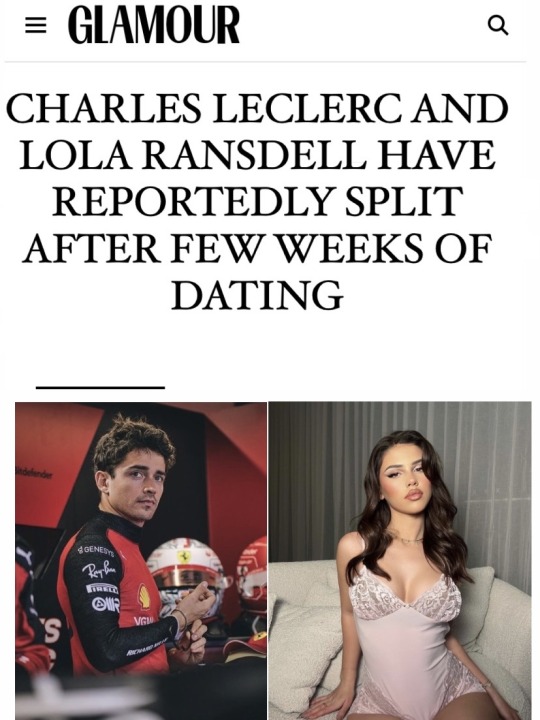
By Glamour
july 22, 2023 8:16AM
Just a few weeks ago, Charles Leclerc seemed to be shimmering with joy about his relationship with Lola Ransdell. “He’s happier than he’s been in a long time,” one insider told Us Weekly. Friends of Leclerc and Ransdell were texting a New Yorker writer who profiled Ransdell to say, off the record, that “this time, it’s real.”
Close insiders were reporting that the Ferrari driver and Youtuber were even planning to share Leclerc’s estate in Monaco, a house he once shared with singing scarlet ex, Y/n L/n. In a recent youtube video, Ransdell herself told her fanbase, “I’ve just never been this happy in my life, in all aspects of my life, ever before.”
Just weeks later, Leclerc’s and Ransdell’s relationship is over. So how did things go from sparks flying to their last kiss so quickly? Let’s hear from the sources.
Shortly after TMZ first reported the breakup, without a reason, a source had more for Entertainment Tonight. “They are both extremely busy and realized they’re not really compatible with each other,” they said.
That checks out — Leclerc had been off the road when their relationship went public, but the summer season of formula one recently kicked off a marathon in Britain, early July, leaving little time for their rendezvous between Ransdell’s own schedule.
But immediately, Leclerc’s split looked and sounded like a bit of image rehabilitation given the multiple controversies following Ransdell. Their relationship became controversial as soon as it began, as fans were quick to note that Randell shared uncanny similarities to ex, Y/n L/n.

Left to right: Ransdell, L/n via instagram
As more insider comments poured in post-split, a narrative seemed to form that their relationship was just a low-key rebound all along.
“It was always casual,” a source told People. “It was never serious,” another told Us. And in an instantly memed quote, another insider told People, “They were never boyfriend-girlfriend or exclusive.” If you read between the lines of the reporting during their relationship, though, this doesn’t seem too far off.
That source who told Us how much “happier” Leclerc was with Ransdell did go on to add, “It’s hard to tell if they’ll go the distance.” And another seemed to tell People that Ransdell was just Leclerc’s sidepiece while he was away from his main squeeze, the Hungary Grand Prix itself. “He’s very focused on his job but is enjoying hanging out with Ransdell when he is off,” they said.
Sure, not all the insiders saw things that way. The source who initially confirmed their relationship to the The Sun said Leclerc and Ransdell were “madly in love” at the time. (Maybe they even said as much themselves.) Another had told Us that the couple was “moving fast,” adding, “They really enjoy each other’s company and want to spend as much time together as possible.” And even we saw the public kissing, cuddling, and late nights at Leclerc’s apartment.

Leclerc and Ransdell spotted at a beach in Malibu last week via@tmz
Nearly every source who confirmed Leclerc’s breakup added that he was just having “fun” with Ransdell. “He wasn’t ready for another serious relationship just yet,” a source told Us, after his previous split from six-year girlfriend Y/n L/n.

Leclerc and L/n spotted at the same beach in malibu, just a year before Leclerc revisited the spot with the Australian Influencer via@tmz
Crucially, that source added that his friends weren’t surprised by the split, echoing a detail from that initial ET report. “Charles’s friends want what’s best for him and aren’t shocked that their relationship fizzled out,” the ET source said. “In fact, some of them even encouraged him to break up with her—his family included.”
So, the classic case of friends and family supporting a relationship in the moment even though they can already see the end. Take it from a “Page Six” source: “Everyone who really knows him has been saying all along that this was a fun, good-time thing that would last as long as it lasted and would be no big deal once it was done.”
That insider went on to call the relationship “a summertime thing,” comparing it to his 2015 fling with Charlotte Siné.

Leclerc and Sine back in 2015, via @charlottesiine on instagram in now deleted posts.
To this unusually chatty and surprisingly profound insider, this wasn’t even a proper breakup. “It’s a natural evolution of a fun little thing whose moment is over,” they said.
Or, at least, whose moment is over for now. As one of People’s sources added after the split, “Who knows what could happen again.”
SEE MORE RELATED POSTS:
• Lola Ransdell seen leaving Charles Leclerc’s Home crying moments before news of breakup.
• Charles Leclerc and Lola Ransdell have unfollowed each other on instagram
• A look back at Charles Leclerc’s Relationships..so far
TWITTER, july 22


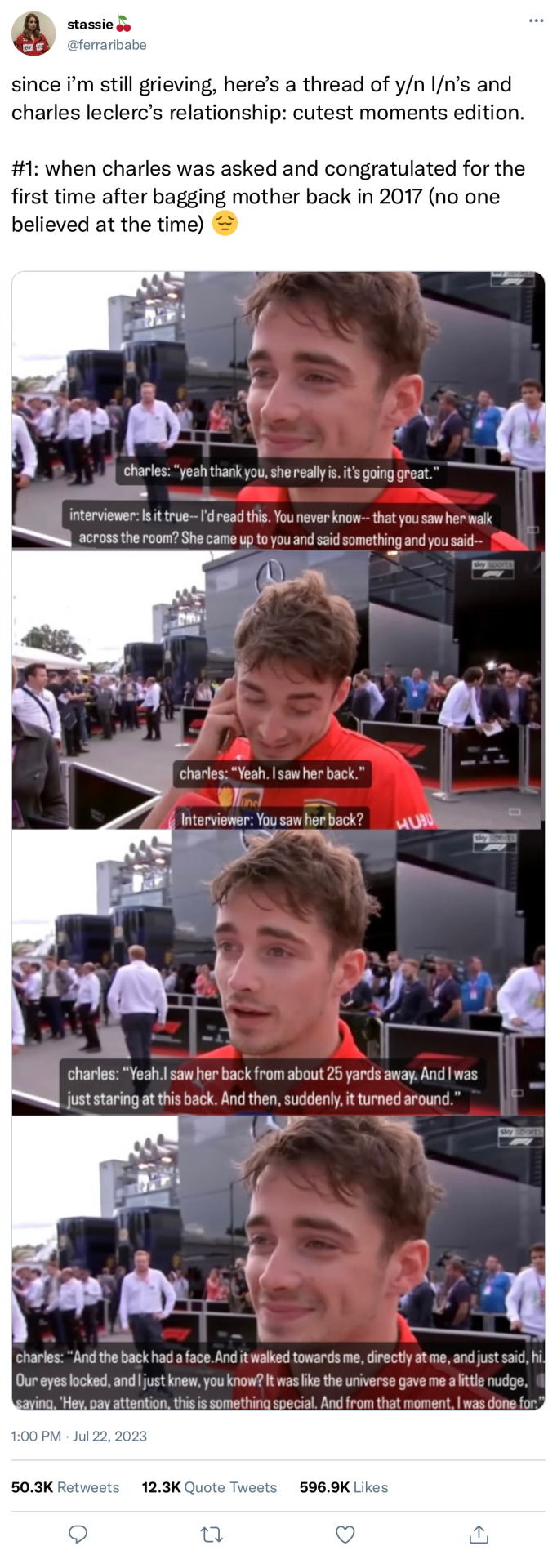

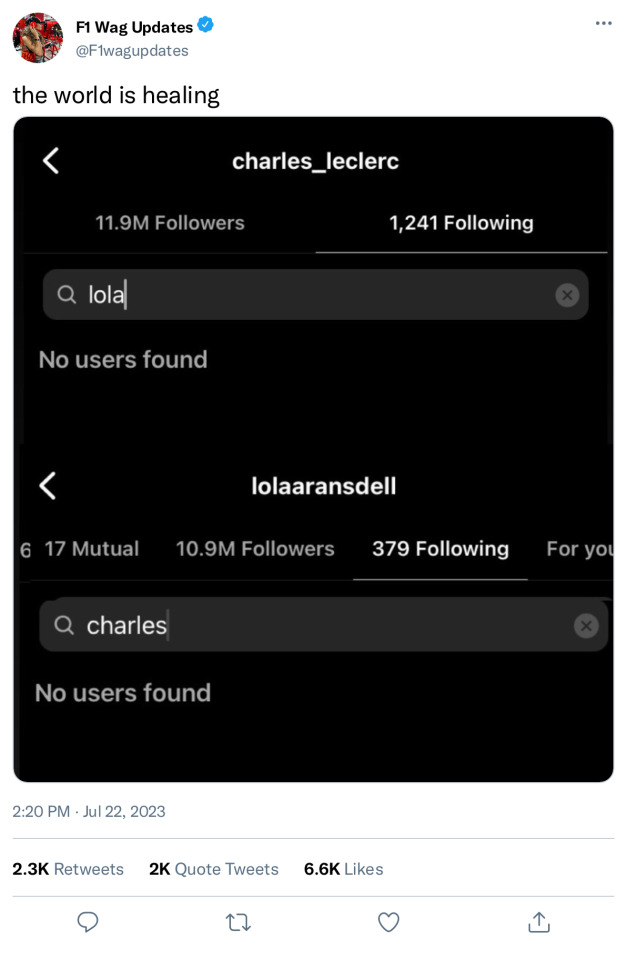
INSTAGRAM, july 22

liked by sabrinacarpenter, aarontaylorjohnson, gigihadid, and 8,829,184 others
yourinstagram good in goodbye. single & music video out 7/28. meet me behind the mall.
View all 17,828 comments
y/nserastour GIRL WHAT THE FUCK
lovinghimwasred i understood that reference ☝️
peteparkerml WHAT IS DREW STARKEY DOING HERE???
madisonbaileybabe my favs in one room omg
obxstarkey it’s just a music video 😀 it’s just a music video 😀 it’s just a music video 😀
obxscenes the devil (and kris jenner) work hard but y/n l/n works harder.
drewstarkey so much for summer love
y/nswizzle i just know this song is abt charles..
charlesleclercfan11 y/nswizzle she needs to leave him alone atp like it’s so obvious and embarrassing. she’s just so obsessed and using his name to stay relevant.
yourinstagram charlesleclercfan11 if you listened closely, you'd know my music's about my life, not a single person. but hey, i guess 'obsession' sells records, right?
madelyncline lowkey offended u didn’t chose me as your love interest
yourinstagram madelyncline dw babe you can be it in the next one 💘
libray/n yourinstagram WHAT DO U MEAN NEXT ONE???
TWITTER, july 22



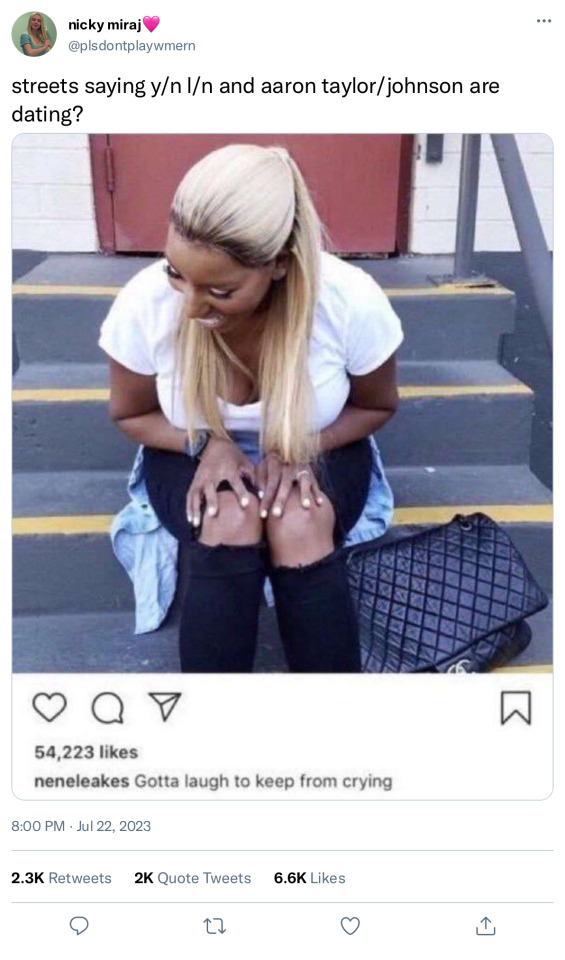
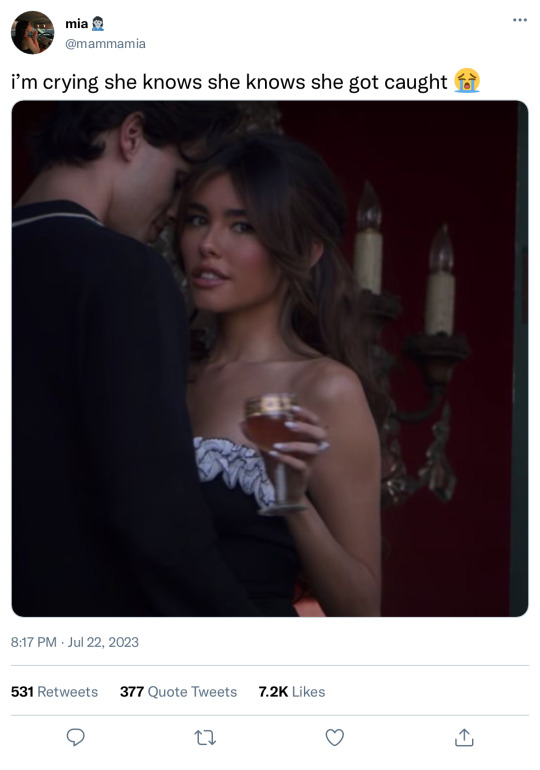
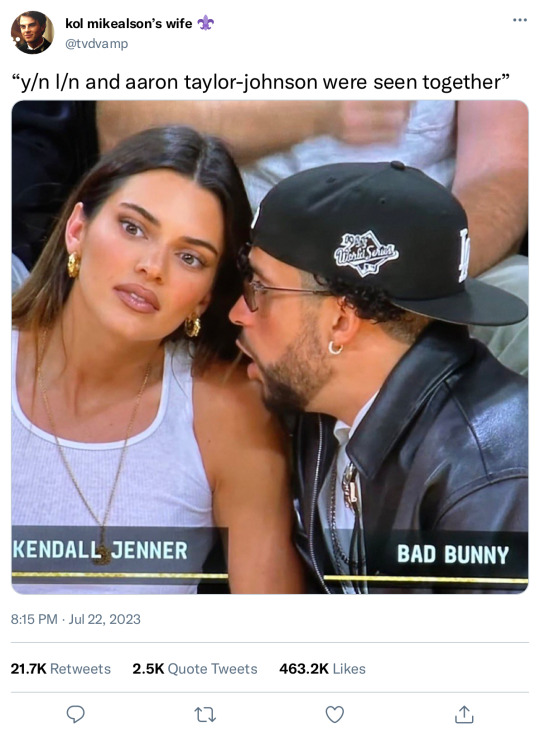
INSTAGRAM, july 22

liked by landonorris, bejeweledleclerc, and 789,174 others
tmz_tv #Y/nL/n appears to have confirmed the dating rumors about her and #AaronTaylorJohnson! See video of Y/n and Aaron driving the getaway car from dior’s backstage after party to a private dinner near the singer scarlet’s manhattan apartment.
view all 137,929 comments
landonorris OH SHIT
szasbutterfly the 1997 y/n’s version promo is insane
kardashianclips I dont understand why it's a big thing ...like she's always dating somebody
kanye_ontop she wrote 10 songs that night
goatwest kanye_ontop 1. "London Love Story" 2. "Stage Lights and Tea" 3. "Theatrical Love Affair" 4. "Leading Man" 5. "Behind the Scenes" 6. "Silver Screen Across the Sea" 7. "Cinema Nights" 8. "West End Serenade" 9. "Take One" 10. "Scene Stealer"
salvatoredelrey this relationship is so 2010s coded
bellyxconrad the beginning of another beautiful song for us #your/fandoms/name
user31 maybe y/n should focus on her music and less on her love life. It's getting old 😒
TWITTER, july 22
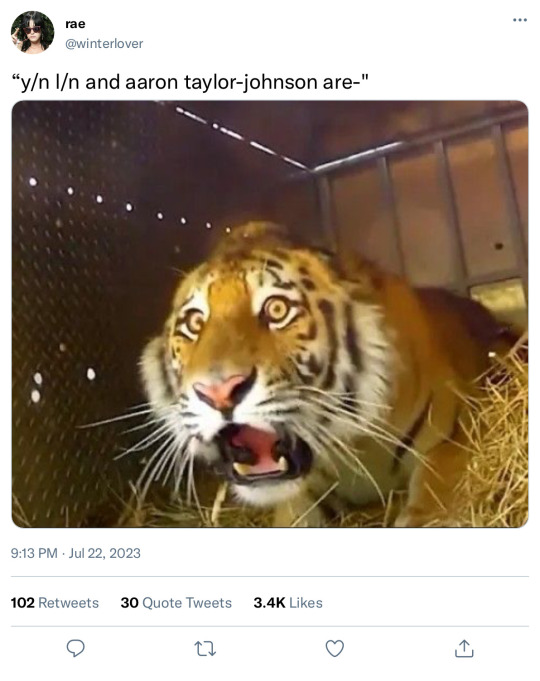
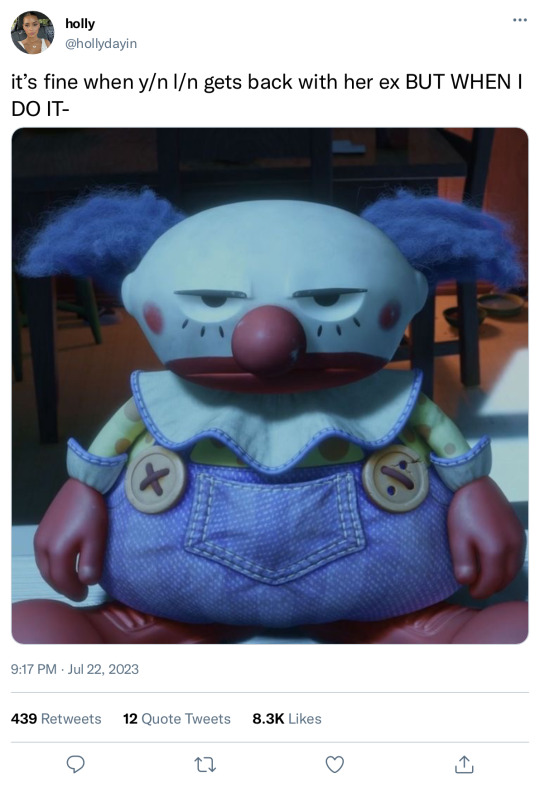

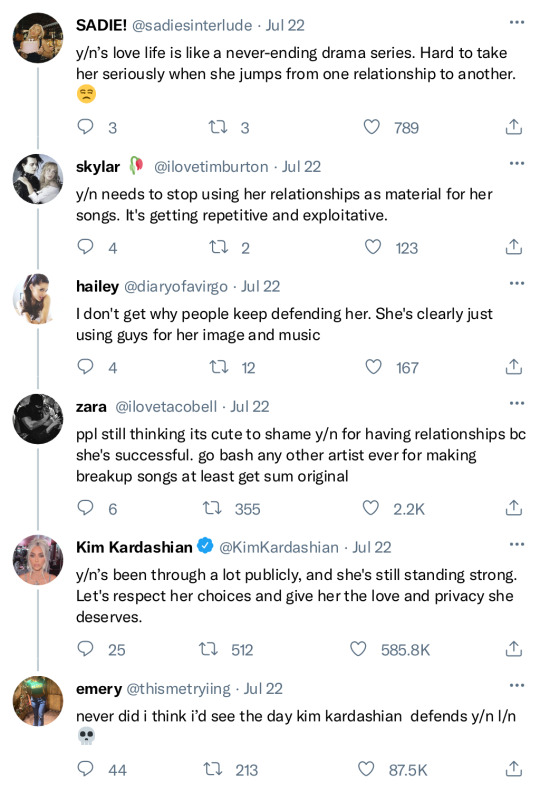
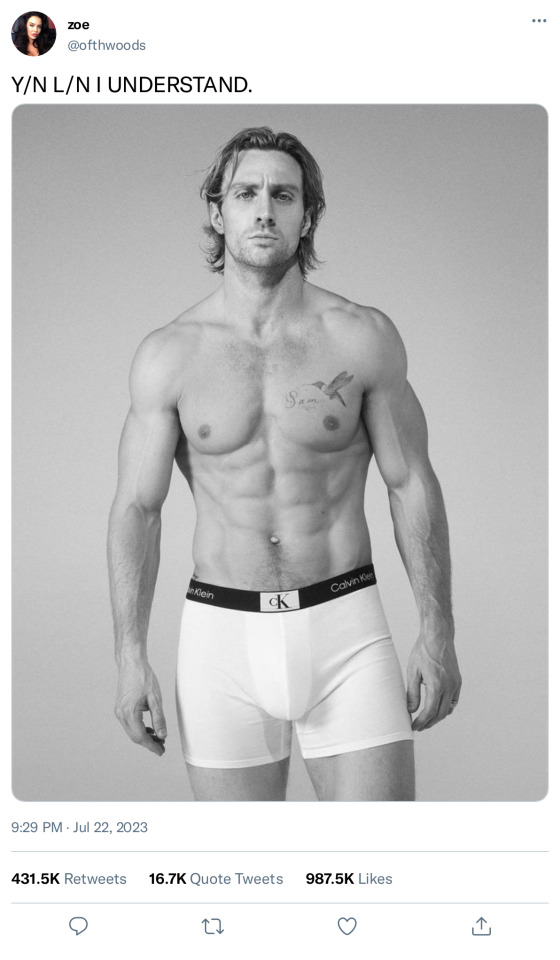



ally's radio 📻 : HI GUYS IM BACK! sorry for the two month hiatus 💀 anywyas, SECRETS OUT ATJ IS THE NEW LOVERRR (bless up) (henry was so, so close) drew isn’t going to interfere w the story, just thought it’d be fun to throw him in there bc he’s hot😍. what do we think? also what do we think charles’s reaction is gonna be? lmk bc i’m so curious how y’all think this is gonna play out. i have an idea, but i’m welcome to others ofc.
taglist:@incoherenciass@dakotali@405rry@topaz125@sassyheroneckgiant@hevburn@itsmytimetoodream@ivegotparticulartaste@crowdedimagines @asterianax @haydee5010@scenesofobx@christinabae@magical-spit@dessxoxsworld@myareadsbooks@honethatty12@hopefulinlove@diasnohibng@gentlemonsterjennie1@hummusxx@eugene-emt-roe@taestrwbrry @perjarma @cxcewg@chimchimjiminie16@glow-ish@allywthsr @millyswife@mrsmaybank13@black-swan-blog27 @stargaryenx@lilsiz@ohthemisssery@leclerclvr
#heartbreak on tour#charles leclerc x reader#charles leclerc#charles leclerc x you#charlesleclerc#f1 imagine#carlos sainz jr#daniel ricciardo#daniel ricciardo x platonic!reader#lando norris#lando norris x platonic!reader#f1 x reader#f1#f1 fanfic#forumla one#f1 wags
1K notes
·
View notes
Text
This post is uh, extremely normal I swear
So hello yes I am absolutely On My Bullshit regarding my new favourite game.
That’s right, it’s the cannibal incest game, The Coffin of Andy and Leyley. And I’m here to shove five thousand words of pretentious analysis down your throat because, and I do not exaggerate, I think it is one of, if not the best written game I have ever played. And I have played a lot of games, including Baldur’s Gate 3, Final Fantasy XIV and Undertale, to name a few narrative luminaries to come to mind.
That wordcount is not an exaggeration. My brainworms are extremely powerful and now you can share them with me as I walk you through my insane skyscraper of inference-driven analysis.
Or you can click away. I really wouldn’t blame you, it’s quite a lot.
Content Warnings: …Yes?
(To drop the bit for a moment, The Coffin of Andy and Leyley covers extremely disturbing material and challenges you to examine aspects of living in this world that many have taken for granted all their life, it is not a comfortable game, this will cover similar topics and will often echo the game’s unremitting scepticism on basic principles of society and humanity and you should look after yourself first. My Content Warning is framed as a joke, but it’s also quite real in that the game is designed to make you uncomfortable and there’s no shame in that not being for you.)
This was originally posted on and formatted for Sufficient Velocity, and you can probably more easily read and discuss it with me here.
With that said, let’s dig in. I have had to split this into multiple posts because tumblr will only allow so many images. There will be spoilers for all endings.
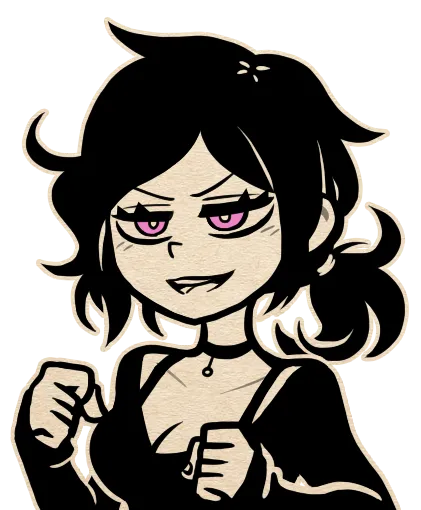
She’s excited, are you?
It’s All About Ashley
It really is, isn’t it? I mean, for approximately eighty percent of the total game as currently released and the entirety of Episode 1, you’re in control of Ashley, just as she’s in control of her and Andrew’s relationship for 80% of the game, up until the various ending sequences where it begins to slip. The only other characters who really matter at all in and of themselves are Andrew and her mother — and the former is under her thumb, and she eats the latter. It’s all about Ashley. Even her obsession with Andrew is, ultimately, about Ashley.
But who is Ashley? What is Ashley? Why is Ashley, even? Let’s take a look.
Ashley as presented to us in Episode 1 is very straightforward, so let’s list off the traits we’re given — she is malicious, she is fearless, she lacks empathy, she doesn’t have anything resembling a conscience, she demands Andrew belong to her and her alone, she has him at her beck and call.
In Episode 2, we’re ostensibly shown how she has him at her beck and call— she leverages the threat of reporting Nina’s death over him and had him swear to be with her forever. We’re shown that even as a child she was “just, like that” — but as a child, she hadn’t learnt to live with it yet, to laugh at the farce of it all.
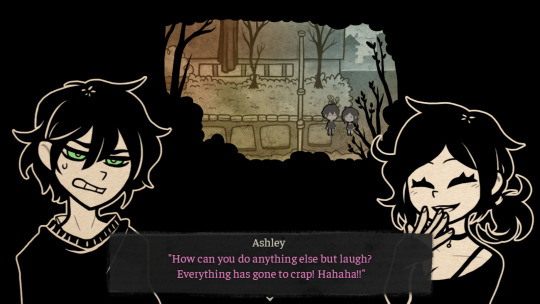
Yeah, exactly like that!
And she does this throughout Episode 1 — The Coffin of Andy and Leyley is a remarkably silly game much of the time, finding moments of absurdity and levity against a backdrop blacker than pitch — and most of the time, your internal narration is coming from Ashley and the jokes will not-infrequently come at her own expense.
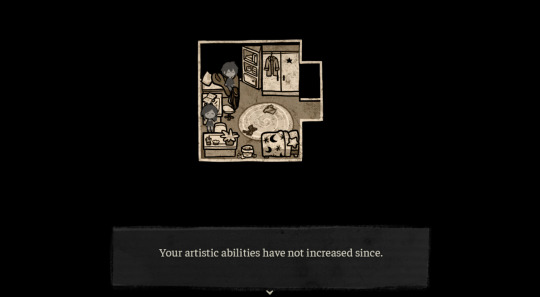
She will later get negged by her human sacrifice for her poor ritual circle drawing
Her reaction to being told that her soul is as dark and viscous as tar is “You guess you already knew that” — it’s confirmation to her, not new information. Ashley knows who she is. But who taught her this? There’s layers to this, nothing in this game is as simple and straightforward as it appears at first sight, which is why I’ve been obsessing over it for days.
While it’s common in fiction, the truth of the matter is, most ‘bad people’ really do think they’re good people. But Ashley has never once thought of herself as a good person — or perhaps better put as a person worthy of love — as we learn across Episodes 1 & 2, with our flashbacks to Andy and Leyley and the VERY VERY QUIET!!!

I really wish I had space in this essay to talk about this, but I’d like to touch on these being traits usually more easily forgiven in young boys than young girls at some point.
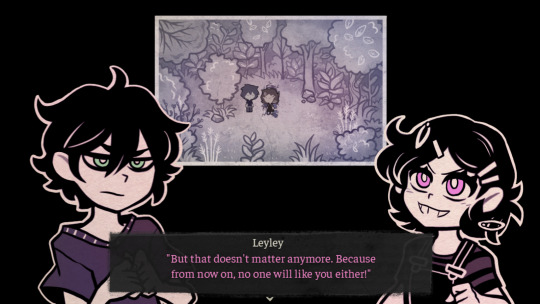
If she removes all other options, only then can she expect him to like her.
This is something that is echoed in the modern day — her seeming self-assurance is easily shaken and she reaches out to the world — usually Andrew — to affirm and validate her, soothing her insecurities, using any tool she deems necessary. Even when her life is on the line when Andrew has her by the throat at the climax of Episode 1, the only ‘compelling reason’ she can give Andrew to not kill her is her ability to soothe his nightmares. When he tells her there are sleeping pills for that…
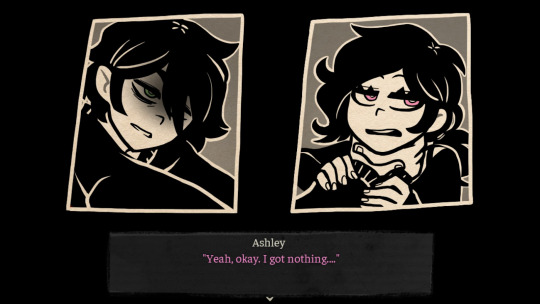
Most people would have a bit more to argue for their existence.
While she, unlike Andrew, acknowledges having had friends before the quarantine… you know she’s got a point that they didn’t even bother to answer her calls, that was clearly not something the state was interfering with given Andrew’s calls with his mother and his girlfriend, and given her general demeanour it’s not hard to imagine that… they weren’t ever very close. When we see her and Nina talk in the infamous ‘box scene’, it’s clear that Nina doesn’t like her very much, despite Andrew’s assessment of Nina as being one of Ashley’s friends.
We see further support for her general lack of companionship in her dream sequence in the Burial route — Leyley and Leyley Alone. No matter what you do, you can’t place the pink plushy at the family table, the flowers won’t bloom if you give the Julia and Nina plushies her own as a companion instead of Andrew’s — and if you’re bold enough to go for the ‘incest route’, in the ‘Love’ room you see that no one ever looks happy to be with her in the childlike depictions of her history, nor is she happy in turn, save for when she’s with Andrew. In a bit of heavy-handed metaphor, the player then overwrites all of these tense, upset, hard moments with Andrew, having him fill in for everyone else in life — and happy with her.
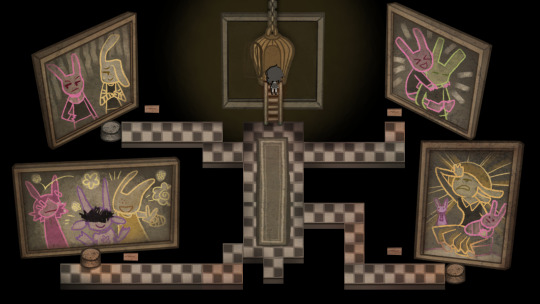
Once Upon A Lousy Life…
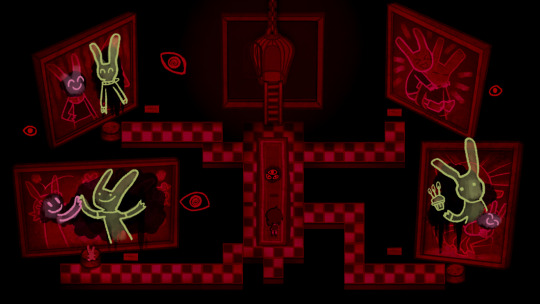
THE END
And that’s why she needs him to affirm her, because no one else ever has and no one else ever will. It’s even included in their comic beats — when the siblings are getting along well, they’ll often play a game where Andrew dramatically overpraises Ashley while she demands more; it’s a comedic bit but I mean — it really does matter to her!
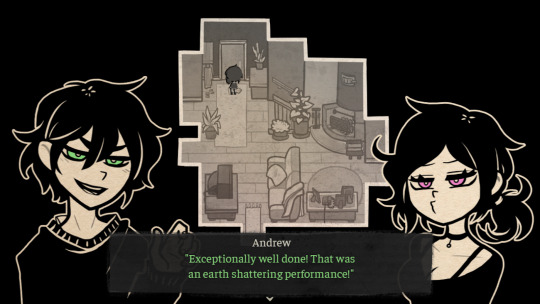
For the record, she opened a door. She gets a little heart in a speech bubble after this exchange.
We have a great example of this dynamic, that of insecurity and affirmation, in Episode 1, after Andrew has killed for her, butchered for her, his girlfriend broke up with her, he’s seemingly thrown his entire life away for her… she’s still insecure over her relationship with him, she’s uncertain of her control and she needs him to reaffirm it for her.
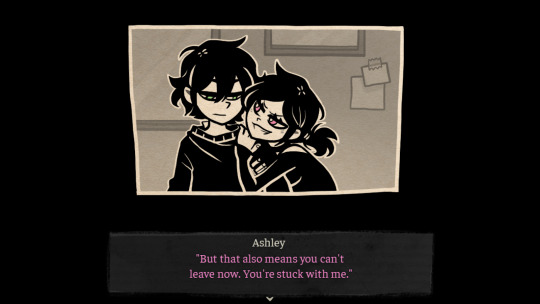
This is her victory, surely?
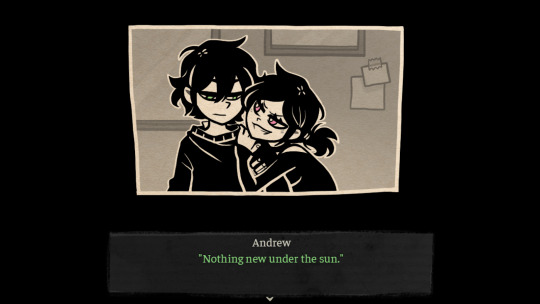
Andrew affirms her once, with his usual dead-eyed look.
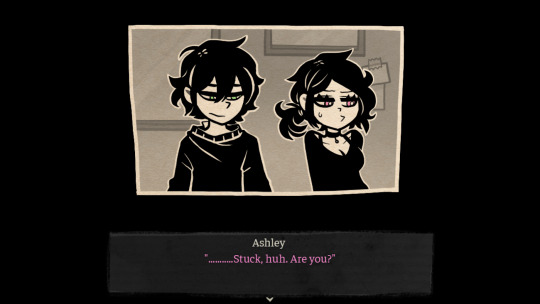
But she's still not so sure.
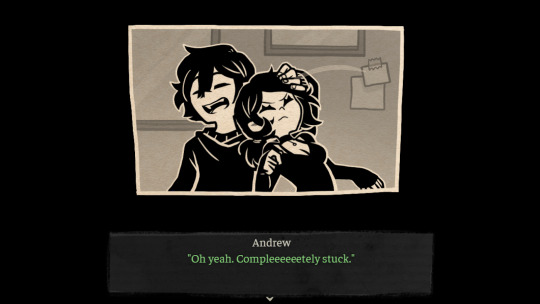
He actively reaches out to affirm her again with cheer.
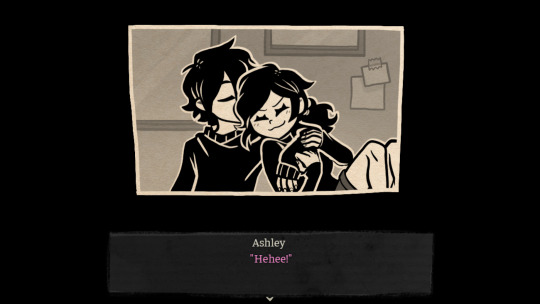
Look how happy she is!
While it’s most obvious and clear cut here, it’s hardly the only case. Let’s look back to the aftermath of Andy and Leyley and the VERY VERY QUIET!!! (I’m not using the other name). Leyley is, after similarly extreme acts — he murdered a girl and hid her body for her — convinced Andy doesn’t like her and she needs this leverage to keep him around, to meet her basic needs for survival. Because that’s what this is — she receives no care of affection elsewhere, so she forces it out of the only source she sees available through the means she sees as necessary.
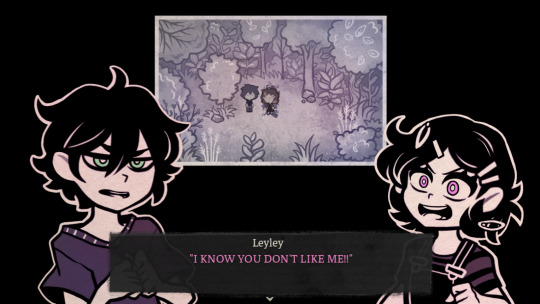
I really hope we see some of their earlier childhood in Episode 3
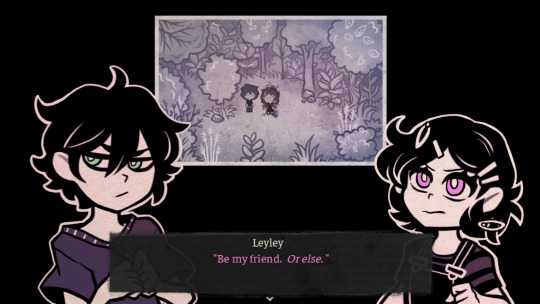
What exactly made her like this? Was it just neglect, or something more specific…
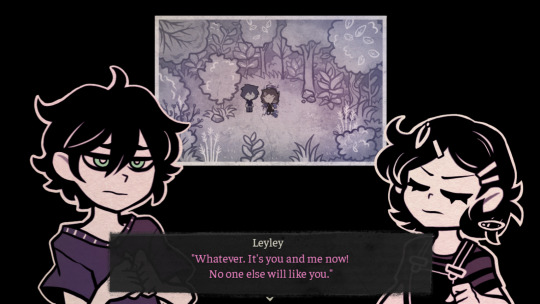
She needs this to be the case because otherwise she doesn’t believe he’d stay.
This pattern repeats throughout — Ashley’s insecurities are hit on and she reaches out to Andy to affirm that she is not alone, and she will use any and every tool to exploit her ostensible control over him and force him to be what she needs him to be — and as long as she has that, as long as she is everything to him and it’s not possible for him to leave, she’s happy. As long as she thinks he loves her in her very particular, very peculiar view of love, she’s content, come what may. As long as Andy and Leyley are together, they can take on the world.
Let’s talk about that view of love, because there’s always more layers to unpack here I’m only scratching the surface with this essay — Ashley consistently refers to anyone else Andrew may have befriended or spent time with as a whore, a slut, a bitch — highly gendered insults that bring to mind the idea that he’s cheating in some way. But it’s not even about sex — when Andrew mentions that their parents had friends, she accuses them of cheating on each other in the same way!
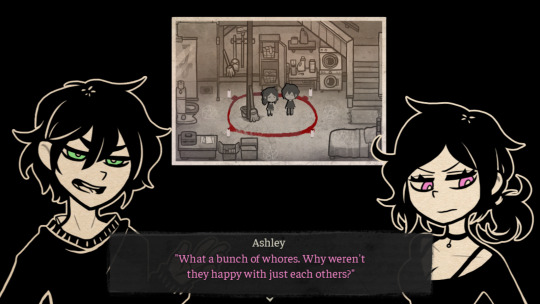
There’s a lot to unpack about Ashley’s view of femininity and the role the patriarchy plays in their relationship.
Any kind of emotional engagement, any kind of commitment, any kind of life outside of your significant other is, to Ashley, cheating. Because that’s what she needs from Andrew, a seeming complete and total commitment, secure in her place as the only thing in his life, because she cannot understand anyone picking her if they have a choice.
This insecurity she has in her relationship is what drives her to empower the trinket — he can’t leave her as long as she can protect him with prophetic dreams, after all. She needs every kind of leverage she can get because until she succeeds in being everything to him, in devouring him so completely she has him in her thrall mind, body and soul she can’t be sure of herself — hell, her dream sequence in Burial has you placing Andrew’s signature green plushy, ‘the best thing in the world’ in a cage far away from anything else.
Ultimately, it really is all about Ashley — even her seeming obsession with Andrew ultimately comes back to her own insecurities. If she is everything to ‘the best thing in the world’, some of that ‘best’ must surely reflect on her!
But that’s enough about the more normal, straightforward and understandable sibling.
That was not a joke.
Andrew’s Rank 100 Deception
The greatest trick the Devil ever pulled was convincing the world that he did not exist.
Let me explain.
You might have noticed that in the previous section I often use language such as ‘ostensibly’ or ‘seemingly’ to describe Andy and Leyley’s relationship, and there’s a good reason for that. From the beginning of the game through to its end, Andrew is lying to you, the player, without ever falsely representing or misinforming you about events that occurred.
The common, or obvious ‘initial take’ on Andrew as presented in Episode 1 is fairly straightforward. The game primes you to think this way, it frames things and strings reveals just right so as to make it very easy to overlook the incongruities it introduces in Episode 2. He’s a victim. Plain and simple, Ashley is his abuser and he is her victim and would be fine, a normal albeit kinda depressed guy without her.

It really is not a difficult conclusion to draw
You can go all the way through the game, have him try to accept his mother’s olive branch and enter the Decay route as a method for him to finally actualise his desire to get out from Ashley’s thumb and it makes sense, it’s a reasonable way for the story to go, given his character.
You see him this way because the game primes you in Episode 1 to view their relationship like Andrew does — he’s lying. He’s lying to himself, he’s lying to Ashley and he’s so good at it — Deception Rank 100 — he even lies to you. Without misrepresenting a single event or otherwise misleading you directly, the game gets you to buy into his preferred self-perception. Nina? Ashley. Julia? Ashley. The murders they commit in the course of the game? Ashley, Ashley, Ashley, it’s not his fault he’s not to blame he’s just a doormat at the beck and call of his demonic sister.
But he wants to be there. From the very outset, the very first puzzle, that’s made clear. Does anyone else remember this exchange, from right at the beginning of the game?

Ashley wants to investigate the music!
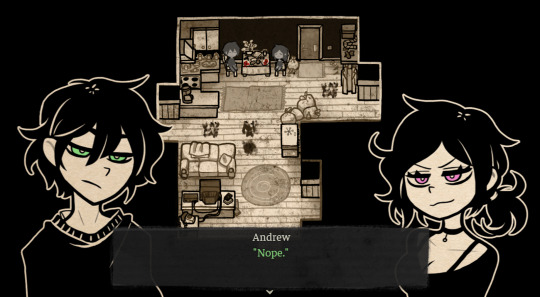
Andrew disapproves…
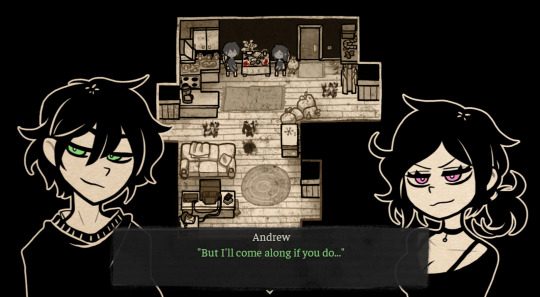
…Or does he?!
Like. Listen. Okay. You do not frown when saying ‘Nope’ and then smile when saying that you’ll instead tag along if they do it if your heart is at all in the no. That’s not an objection, that’s using Ashley as his excuse. Especially if you immediately throw her the balcony key that she could not possibly have gotten from you by force (more on Andrew’s ability to use force later).
This is the very first time you control both characters together with Andrew following Ashley instead of off on his own, the first adventure, the first puzzle!
But put a pin in that for now, let’s talk about his initial framing in Episode 2 first. Episode 1 has set us up to, generally speaking, believe the superficial framing of the siblings as portrayed in its promotional art:

The question that we then ask, right at the heart of it is… why is he a doormat? We explore this in his dream sequence in Episode 2, which does make it clear that the boy’s not okay but— it’s real easy, given the priming from Episode 1 to make you think that he’s the one with the originally functional moral compass, to think that that him being fucked up is damage done to him by Nina’s death and being bound to Ashley for his entire life. She corrupted him.
But, well, is that the case?
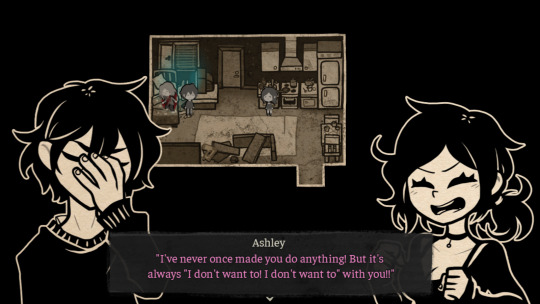
You're primed to ignore this as manipulation (which it is) but the best manipulation has some truth to it.
Precisely two things spur Andrew to action in the entire game, consistently — they are the fear of consequences and Ashley. And the first incident of that fear, the very first time we’re shown his seeming moral compass as a kid — the first time it’s really hammered home that it’s a fear of consequences rather than any true moral qualms is after Nina’s death. And why does he fear consequences here?
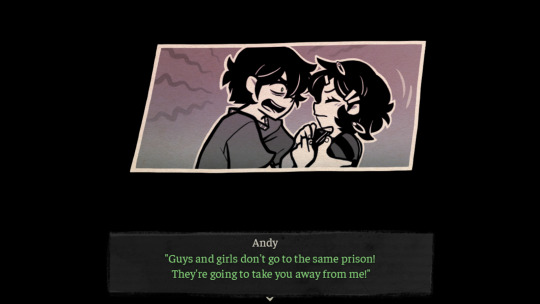
……
The ‘natural’ read that many take away from this sequence, particularly those who have only played Decay, is that Ashley browbeat him into doing this against his will, using emotional blackmail to overwhelm his objections, and then used the event itself to bind him to her forever as her personal doormat.
In a strict sense, this is true. But this doesn’t match up with the details, something the game uses shock to encourage you to overlook. That outburst is before any kind of threat has been made, and absolutely nothing either of them say anything about it being morally bad until Ashley weaponises ‘you’re a bad person’ against Andrew — morality didn’t seem to enter his mind or the equation at all until Ashley brought it up. More than that, his greatest fear and driving motivation even prior to that is, as shown above, being taken away from Ashley.
She, of course, recognises this and uses it against him. But she never needed to, it didn’t change anything about Andrew’s attachment to her, it was there to address her own insecurities.

Just like to touch on how a lot of his affirmations are preceded by him confirming her insecurities.
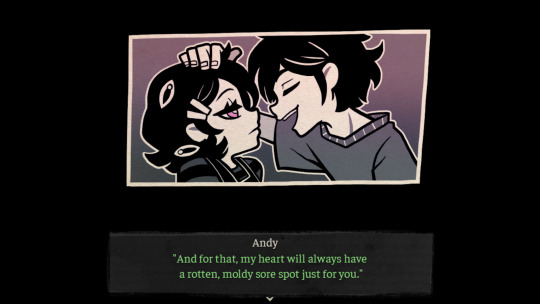
I adore this phrasing
There’s a second prong to this as well, to the question of ‘who really calls the shots here’ because — Andrew can, at any stage, apply an ‘ultimate veto’ of physical violence. The game is very clear to the player that that is on the table — even when they were children, when Andy swears their blood oath, he briefly considers killing her — and take note of how he ultimately got a ‘winning’ condition out of her by not specifying there wouldn’t be others and she is forced to accept that, there. Even outside of their most serious confrontations, Ashley is portrayed as having to convince, manipulate or otherwise coerce Andrew into going along with her schemes — she really can’t make him do anything, she doesn’t have the supremacy in violence and, to a lesser extent, capability that would allow her to.
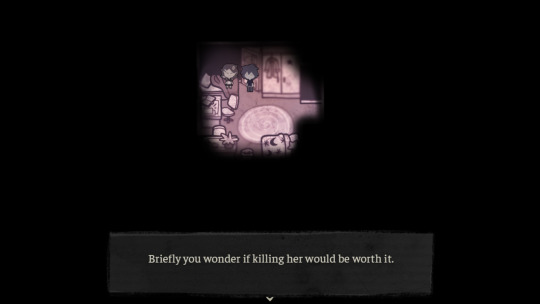
Andrew, you are like ten years old.
The truth of the matter is, Ashley can only make Andrew do anything because he lets her. I don’t mean in the sense that I’m saying abuse victims let their abusers emotionally abuse them, I mean in the sense that he is clearly considering his options on the table and choosing to discard those that could stop her, or bring an end to any of this. He needs her.
But it’s true that he hates her, too. He has to hate her, because if he doesn’t hate her, if he isn’t forced to have done this, that means… he’s responsible. And nothing, at the start of the story, is as important to Andrew as avoiding the consequences of his own actions, not even Ashley. By the midpoint, he loves her, he hates her, he can’t live without her, he wants to kill her — by the end… well, that depends if you’re on Decay or Burial, but more on that in a bit.
A great scene to study for this dynamic is the climax of Episode 1, when Andrew grabs Ashley by the throat and considers strangling her to death. She’s pushed him too far with hurtful words and assault, and he’s seemingly had enough.
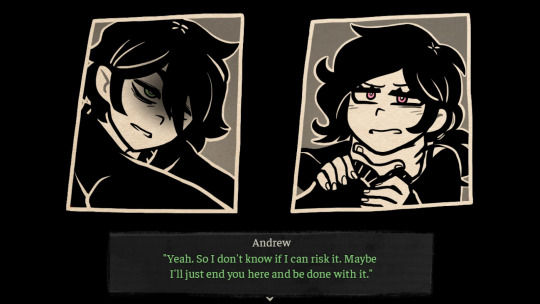
It’s still framed as a question of risk, of consequences happening to him.
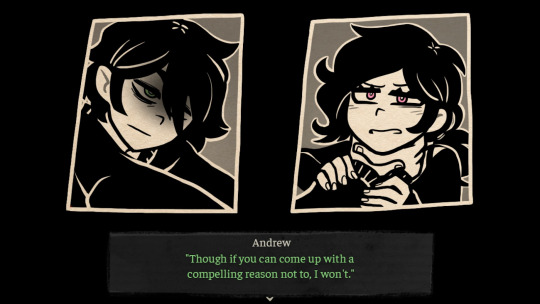
Like, this is not the usual behaviour of someone who’s been pushed past their breaking point.
He tells Ashley that he wants to kill her, because she’s just going to throw another fit and that’s a risk to him. She is… not framed as being able to fight back (she does have a gun here, and more on that in a later essay, maybe). He’s so calculated in how he approaches his use of violence here, which isn’t at all what you’d expect of someone about to commit a crime of passion… but it’s very easy to overlook because of the abuser/victim narrative that the player fits his behaviour into the narrative that the game primes them to accept, brushing incongruities under the carpet.
At the start of Episode 2, we get to control Andrew for the first time, and the first obvious holes in his cover start to show. Some of this is optional — you only learn that he’s been faking having nightmares in order to share a bed with Ashley if you choose to go back into the motel room and check the bed, for example — but not all of it.
----(See reblogs for the second half)
1K notes
·
View notes
Text
You may not like to hear this, but Cruelty Squad is the best cyberpunk game out there. All your Cyberpunk 2077, and Stray, and Deus Ex games, plated in shiny chrome, don't grasp the core essence of cyberpunk nearly as well as Cruelty Squad, a game made of filth and disease. It's barely even cyber as well, it honestly leans into biological augments more than cybernetic ones.
But that doesn't matter. Because the absolute core of Cruelty Squad, is that the world is a sick, corrupt festering thing, twisted by greed, corruption, and unrestrained capitalism. Human life has no value, and this is explicitly seen in the narrative and in the game mechanics. And the thing that really stands out is that it deliberately tries to shock and disgust the player.
Sure, many cyberpunk games purport to engage in those themes, of greed, corruption, etc. But there is a dissonance. We are told narratively that this world is horrible, but visually, we see a cool, technologically advanced world, where people are badasses. And the problems in these settings are close enough to our own, real life problems, that a slightly enhanced dystopia might not seem so bad, when it comes with such technological advancement.
Cruelty Squad does not do that. There are no badass characters in the game, rather a series of pathetic, pitiable wretches who act in despicable ways, lacking empathy or humanity. The augments are horrific in such a way that the player does not fantasize about having them in real life. All of the textures are disgusting, and deliberately so. The sounds are abrasive and offputting. Even the UI is hideously ugly. It isn't poorly designed of course. But rather, designed in such a way that the player should never develop a hint of sympathy, longing, or good feelings for any aspects of that world. The underlying assumptions underpinning the cyberpunk genre are not to be romanticized, but rather exposed as a viscerally loathsome thing, which makes one reluctant to touch any part of a world tainted by it.
There aren't a lot of games which linger, and occupy headspace. But Cruelty Squad is one of them.
890 notes
·
View notes
Text
On Medusa from the PJO TV Show: A Survivor and complicated antagonist
I'm not the only one obsessed with the version of Medusa and I know it.
She's beautiful, she's eerily calm, she says, "I am a survivor," and you feel that. She is the symbol for women out there who don't want to be bullied anymore, and more recently Medusa's head has become a symbol of women fighting back with the #MeToo movement.
But I'm not writing this to talk about Medusa as the Gorgon from the Greek mythos. I'm here to talk about how she was written in the PJO TV Show. So let's get into it, shall we?
Note that some ideas from this meta are expanded on from this Variety article where the writers of the show and Rick and Rebecca Riordan, speak about the changes they made from the book to show adaptation.
A victim of an abuse of power
In the Variety article, Rick says, “There are many versions from ancient times of what happened in that temple with Medusa and Poseidon and Athena. Who’s to blame? Who’s the abuser? What’s the real story? It’s fiction, but it certainly is important to acknowledge that there is abuse involved here. Abuse of power.”
Like in all Greek myths, there is never exactly one "correct" version of a story. In many, Medusa and Poseidon basically have a one-night stand. In some, they have a mutual affair. In others, it's Poseidon who seduces Medusa into Athena's temple, and in others still, Medusa is a victim of assault.
What most versions of the myths do have in common is the fact that Medusa and Poseidon had some sort of relationship that produced at least two children (Pegasus and Chrysaor). Most versions (both Greek and Roman) also depict her as a tragic figure and a beautiful maiden.
Athena is involved in earlier myths as the goddess who put her head onto the shield that averts the gaze of enemies. In later myths, she is the one who curses Medusa to transform into what we know of her today after Athena discovers her relationship with Poseidon on her sacred ground. Poseidon, of course, gets let off scot-free.
Depending on how you read into the myths, there could be a variety of different things happening here. So, I like what the show did. They made it vague enough that this is still middle-grade level like the books, but they also expanded on what the books couldn't because they are originally written from 12-year-old Percy's POV.
They basically keep nearly all aspects of the story and original myth possible. But in the end, Medusa is indeed a victim of abuse.
Her real curse is not that she is hideous and turns people who look into her eyes into stone, but that she is made invisible by the curse and she is not heard. Not one person can look her in the eye and live to tell the tale. She can't show her beauty, so she chooses to live with what she has. Even with a slanted hat covering half her face and eyes, you can tell she's statuesque (see what I did there?) and a beauty.
She chooses elegant clothes, pretty jewelry, a neat hairstyle, a hat that accents what you can see of her features, and red lipstick that makes you think she could be desirable.
But it doesn't change the fact that Poseidon had his way with her, told her he loved her, and then she was the only one left with the punishment for what happened between them. Athena cursed her out of anger.
Medusa revered Athena who is a virgin goddess, and of course, Athena would be upset when one of her devout followers is suddenly not a virgin too. Yet, Medusa mentioned earlier in her narrative in episode 3 that Athena never answered her prayers at all and never gave an indication that she was listening. So out of all the times she pays attention, it's to curse her for something she doesn't like?
Athena paid attention to Medusa when it was convenient to her and Poseidon left her when Medusa was no longer useful to him after she was cursed.
This version of Medusa is left to the wolves to defend herself and live with herself, a victim of abuse of power from multiple ends and from gods she thought she could trust.
Medusa and Sally Jackson
What I found the most interesting in episode 3 was the fact that Medusa sprinkles the seeds of doubt into Percy's mind that maybe the loving relationship he thought his mother had with Poseidon was not what actually happened.
In the Variety article, Rebecca Riordan says, that Percy has to think ‘What has my father done? Has he changed? How do I see myself in relationship to that?' while Rick says that “Percy can only judge his father by the wreckage he has left behind."
The fact of the matter is, Percy is 12. The book series is for a middle-grade audience, and the show is too. So people out there thinking "This could've been darker!" need to calm down and take a back seat. The books always did a good job of introducing deeper, darker topics to children. The show should stick to the same strategy to keep what made the original story so good.
But, what the show does here is make you think. If Poseidon could abandon Medusa like that, use her like that, then maybe Sally Jackson was abandoned and used too.
Her show story does a good job of connecting two women who had a relationship with the same god, connecting women who thought they could trust someone but were left to fend for themselves.
Look at where Sally Jackson is now at this point in the story. Not only was she forced to marry Gabe Ugliano to use his stench to protect her son who attracts monsters, but he is an abusive man both to her and to her son at least verbally. In the books, it's not suggested until the very end of The Lightning Thief that Gabe has been hitting her outside of Percy's POV. I've seen people forget that and immediately write off that Gabe wasn't "abusive enough". C'mon people. Just because Sally fights back verbally doesn't mean he wasn't still abusive in his actions in the first two episodes. Even if they decide not to suggest that he was also physically abusive to Sally, doesn't make him sneakily using her phone, demanding to ask why she has to use his car, and demanding for her to make food for him any less abusive.
Sally chose that life because the most important person in the world to her is her son, and even though Gabe is a total jerk, she convinced herself that she could take what he gave her because what he did to her was better than having her son being hunted and maimed by a bunch of Greek monsters because of who he is. To top it all off, now Hades stole her away into the Underworld.
Medusa, in a similar way, was left to fend for herself. She chose what was best for her, and lived in her new form because she could not change what had happened. She wants to save Sally too because she sees Percy as a boy whose mom was abused the same way she was.
Medusa's brilliant role as an antagonist
Now we're here, the main reason I wanted to write this giant thing. I saw a weird take on Twitter saying that Medusa in the show should not have been beheaded like she was in the books because then that negates her whole story and what she stood for.
Well, in my opinion, that is a shallow take on what the show's Medusa is trying to portray.
Medusa is an antagonist. In the myths, she is an antagonist. In the books, she is an antagonist. In the show, she is an antagonist. She gets in the way of Percy's path for his quest, she suggests that he doesn't need Annabeth and Grover, and that only she can save his mom with him.
In both the books and the show, there are hundreds of statues of people she had turned. Sure, some of them could've been attacking her, but there were a lot of people there who were victims too. I'm sure that screaming lady didn't mean to do something to Medusa, and Grover's Uncle Ferdinand? He was the only statue who appeared calm and collected and there was nothing to suggest that he was out to get her. He was only on his journey to find Pan.
Medusa has killed people, and innocent people at that. For thousands of years. And not just people she had to, and not a small amount. Then, she suggests that Percy let her kill his two friends who are children.
To her, Annabeth and Grover are dead weight because of their loyalty to the gods. Annabeth wants to be noticed by her mother. Grover wants to make sure the world doesn't end. I mean, they all don't want the world to end but I digress.
Medusa hates the gods. She wants to save a woman who is like her. She will protect that woman's child. But she will do anything and destroy anyone to get that end result.
A victim is still a victim even if they are a villain or an antagonist. Her methods don't make her any less of a victim of abuse. But that doesn't mean they are right.
So yes, when Percy runs away from her to keep his friends alive and she takes off her hat to stalk them around the room to turn them into stone, she does indeed need to be beheaded. There is literally no other way to defeat her. They can't look at her or they die. So they have to make her stop moving.
Unfortunately, a person like her with deep and complicated motivations would never change their mind when they feel they are betrayed. So, Percy did what he could to protect himself and his friends from dying.
Still, it's a poetic death as it is in the books. He mails her head to the gods and mentions Athena specifically for her punishment of Medusa. He's impertinent.
Medusa didn't deserve to be punished. But it's been millennia and she made her choices. The abusers did not get the punishment they deserved, but maybe now they will. Medusa's head in her (temporary) death, will be a testament to her victory, but also a testament to her downfall.
#pjo meta#percy jackon and the olympians#pjo#percy jackson and the olympians#pjo tv show#pjo tv show spoilers#medusa#percy#annabeth chase#grover underwood#sally jackson#poseidon#meta
226 notes
·
View notes
Text

𝐃𝐎𝐍‘𝐓 𝐁𝐄 𝐂𝐑𝐔𝐄𝐋

after you were trying your hardest, over and over again, to make your relationship work yet still failing in the end, you ultimately decided it‘d be better to end it with scaramouche.
୨୧ WORD COUNT: 1.7k
୨୧ WARNINGS: angst, gn! reader, mention of past intimacy between each other, break up, slight yan ?? a sprinkle, scara‘s overwhelmed and doesn‘t know how to be normal.

love.
love is kind, patient. As calm as a rural sea on a silent night.
love takes delight in the truth, in mutual understanding and trust. It never takes offense, it is not resentful.
additionally, love is able to forgive, to hope and to endure so why, why did your love fly away, with no strings and a pair of attached, imaginary wings on their back?
how often did you try to see the once shining radiant light in midst the insufferable darkness you called your relationship with scaramouche.
being guided by nothing but sorrow, you remembered that it wasn‘t always like that, was it?
as a strong believer in the saying of ”whatever you held onto about yourself will eventually come true“, you had manipulated yourself into thinking just that, which had later on caused a swell of deep hope to cover the majority of your burning heart.
you manifested for your relationship to take a sharp turn after barely overstepping each hard coming without escaping unscattered.
committing to a relationship was first and foremost, to accept each trait your significant other had, it truly didn't matter if it was good or bad as long as you were well equipped enough to be there for them.
but when does that not apply anymore?
exactly when it seemed as if you were forgetting about your own well being.
you see, you can twist and turn the narrative but in the end it was obvious that scaramouche had to work through more than 'just' a few hardships.
maybe it would be better for his own health to be alone for a while, to find his true nature and gather a newfound feeling of love towards himself before being able to hold love towards another person.
with an aching, deep throb in your heart, you opened the door to the bedroom you once shared as you spotted your boyfriend, well, soon to be ex boyfriend right away, sitting on the edge of the bed, his sight lowered towards the cold floor.
"you‘re here."
with the burn of pain those words caused alone, the idea of holding yourself back was in vein, scaramouche had you already figured out from the start so hiding the blatant truth would only feed into each negative aspect of the conversation that was developing right now.
"you told me to come, why shouldn't i be here?"
it was strange, truly, the immediate change in his usual tone was apparent, scaramouche sounded distant, as if he already knew what was coming next.
breaking away from your frozen stance, you proceeded to close the bedroom door, each small step well thought out until you were as close as necessary, proceeding.
"can you look at me?"
no matter how much you wanted to get this heartfelt decision over with, you still desired to end it properly, without leaving unanswered questions hidden which would sooner or later poke your mind, more so eat you from the inside out until nothing was left to be devoured.
for a short amount of time, he did not speak, his arms were resting on his thighs as he kept his eyes pierced towards the cold wooden floor, never daring to break away.
you gave him the time, as much as he sought after. At the back of your mind ominous darkened thoughts found refuge in, a cold spider like sensation was swarming up and down the entirety of your spine, deepening the restraint in your voice.
you watched in silence, thousands of questions prowling through your cloudy mind as he, in a trice, decided to speak up, "how ungraciously backward you can be, to force me through this."
the inner voice inside you churned through your body, desperately warning you, a dazed look of bewilderment crossing the irritated state your face was trapped in.
"what do you mean by that?"
with an attempt to keep your trembling lip under control, you gathered the soft flesh in between your teeth, only a tiny bit until the self restraint of your body returned to you.
"i mean it exactly how i said it." on a heavy sigh, he continued with a demeaning voice, the epitome of gradient turmoil blistering your heart, you absolutely despised it whenever he got to talk to you in that precise manner.
"you know my past and yet you still persist." at his final word, he at last, lifted his head to meet your glowing eyes, glowing for the wrong reasons that is as they were welling up with warm tears.
"what do you expect me to do kuni?"
scaramouche flinched at the name you decided to use, after all, it was long forgotten yet whenever you said it, whenever you referred to him with it, it sounded all the more familiar and intimate.
"nothing.. nothing."
swarmed with the view of him, your throat seized. Indigo eyes, crystallized mind, his attention on you was heavy as you decided to move forward, cautiously taking a seat next to him.
the mattress shifted of your added weight, there was no point in arguing but for some unexplained, fucked up reason, it always proceeded to end up like this.
"i never intended to hurt you, but i'm at my limit." the tears in you made your eyes glimmer, the previous confidence that was utterly dominant upon approaching the bedroom before, was long gone with your head hung low, but you still desired to finish what you had started.
"it's always the same, it will always end the same."
much to your surprise, scaramouche for once decided to listen to you. You were wary of the sudden change in mannerism but didn't complain, it gave off a pleasant way to articulate what you wanted to say to him.
"and we need to break up in order to get better."
another hesitation in your voice, he immediately noticed, his throat loosening with an approaching laugh, "oh, so that's how it is."
with a tumble forward, he got off the bed to stand tall, his shoulders tugged back in a confident stance, turning around yet again.
"you just want to cast me aside too, don't you?"
this wasn't fair, how could this possibly be fair in any other occasion?
all the preparation to this conversation, thrown aside, the burning, heartbreaking feeling was tearing you apart, as if trapped in a maze, one you couldn't escape, one that got smaller within each minute, one that would squeeze you to death by the very end.
"you don't see my point, can you at least try to understand?" the past was continuously invading the present, it was devastating.
"can i try, what?" he draws one touch on you, only one, forcefully grabbing your chin in between his fingers to make you look at him, but still keeping the contact with your skin light, as to not hurt you.
your throat grew tighter as a natural response to the once cold air becoming thicker as you spoke, each sentence alluring the feature.
silent anger, like true liquid fire but it didn't spill, he kept it to himself while only showing short nuances of the burning ache eating away his blazing core.
mindlessly sitting on the edge of terror, you bristled on the faint independence you had left in yourself.
"i will always love you, but don't you realize that right now, you're literally showing me why it won't work."
scaramouche could no longer see anything but the threat of losing you, he couldn't hear you, not anymore, his mind was at risk to collapse and break, the hand on your chin beginning to tremble.
is it possible to scream without screaming? to cry without crying or to die without dying? because to scaramouche it felt as if those things were happening to him, right this second in front of you.
"what about all those times we made love to each other, hm? does this mean nothing to you anymore?"
a tear, barely to be perceived, danced around the corner of his eye as it spilled, alone and lost, plastering the cold floor.
"or when you told me that you'll never leave like the rest of them?"
scaramouche remembered those distinct feelings within his chest now, how hysterical laughable, he thought he had long since disposed of them entirely.
yet the one you managed to awake in him was still there, like a micro organism feeding on its damaged host, eating away the spirit until death was inevitable.
the first time he had perceived those world-shattering emotions, he was cast aside by his creator, his mother.
the words you intended to say were murdered in your throat, rejected, "i don't know what to say."
each decision had a consequence laced around it, some more gruesome than the other.
"you don't have to say anything." his innermost self, his being, gathered the last courage to lock his eyes with yours before lastly letting go of your chin, straightening his posture.
you felt the chill in your blood, ice water in your veins, the silence in your ears, the death of your failing relationship. Part of the pain, you could endure.
but could he?
"i should go." with clear, pure agony in your soul, you ultimately rose up from your seat to pass him and reach the door to the exit.
he stood still, not moving an inch of his tensed muscles, letting his thoughts walk out around him, in search of something he knew he couldn't get, at least not now.
"if you think that's the end."
scaramouche didn't intend to finish his sentence to you, nor reveal it, more so did it involuntarily divulge out of him.
what he meant by that was unclear to the both of you, it lingered both unpredictability and uncertainty in the air.
something was not right but you could not decipher the darkened suspicion with your alarm bells pointing right towards them.
it was the end, like a book you closed after reading through it, even if you dared to pick it up again, nothing would change in it.
your relationship was nothing but a broken mirror within a casted ray of sunlight, damaged and split as you left at last, scrambling the final steps out of the apartment you once shared.
to turn around, to watch you go, with the world around him animating death.
passed by limitless silence, he closed his eyes, endlessly consuming the darkness that were his thoughts.
and so, it wasn‘t a tear that slowed out of him, but a hysterical laugh, side splitting and crazy, as he commented for the very last time.
"how foolish you can be, dear."

©2022 anantaru do not share, copy, translate
#genshin impact x reader#genshin x reader#scaramouche x reader#scaramouche x you#genshin impact x you#genshin x you#genshin impact scaramouche#scaramouche x y/n#genshin impact angst#genshin angst#genshin impact x reader angst#scaramouche angst#genshin scaramouche#kunikuzushi x reader#wanderer x reader#genshin impact wanderer#genshin impact kunikuzushi#tw yandere#yandere scaramouche#genshin impact yandere
2K notes
·
View notes
Text
now that i've finished my re-read of the hunger games books, it’s even more baffling to me than before that people compare everlark to kat.aang when they are so incredibly similar to zutara.
a fundamental aspect of everlark’s characterization is that they are star-crossed lovers. and while it's true that that is a gimmick the capitol forces on them, it’s also a reflection of the reality that peeta and katniss were never supposed to fall in love, let alone make it last.
from the very beginning, the odds are stacked against katniss and peeta. their class division keeps them apart in district 12, and in the games you're naturally not expected to do anything but kill your fellow tributes. what peeta does in loudly declaring his love and respect for katniss from the beginning is revolutionary because it goes against everything he's been told his entire life. saying he's in love with her and valuing his life over hers is absolutely radical in a situation that forces you to prioritize yourself and dehumanize your fellow human beings. and this framing of love as resistance is something that repeats itself in zutara's arc, in the catacombs where zuko and katara reach out to one another against everything that tells them to do otherwise, and again in the final agni kai when zuko gives up everything for a girl he had been told was nothing.
they’re love stories because they stem, first and foremost, from love for your fellow human beings — especially in the places where it shouldn’t exist. love for a starving child from a lower class whom you’re supposed to kill. love for a weeping enemy who represents everything you were told to despise. both zutara and everlark are about the importance of unity amidst division, about coming together when the entire world is trying to force you apart. about looking at the person you're supposed to hate and saying no, i refuse, and reaching out in love, in compassion, in empathy instead because you understand that they're not as different from you as you were taught to believe.
and this carries on to the other theme that both ships represent: the need to break the cycle of violence.
one of the main themes that underlies each of these characters’ narratives is how easily (and even justifiably) they could’ve perpetuated the harm that was done to them. peeta, katniss, zuko and katara have all suffered without cause, and it would have been understandable if any of them had let that suffering twist them into vengeance and inflicted it back upon others. it would have been encouraged even, in the societies they live in, for them to unleash their rage upon those seen as deserving of it. to become like zhao or hama or gale or president coin. but what defines each of these characters is that instead of allowing their suffering to overcome them, they choose to help — not harm — others, even the people they would have every reason to hate. that’s why katniss and peeta refuse the chance to hold another hunger games with the capitol’s children, why zuko helps an earth kingdom town, why katara risks the invasion itself to free a fire nation village from tyranny. all of them have been victims of unjust violence and oppression, sometimes even at the hands of other victims, and that’s exactly why they refuse to stand by or be complicit as others suffer the way they did. both everlark and zutara are about looking at the darkest version of yourself, the person you might have been, and refusing to go down that road. to understand that you are more than what your circumstances make you into. to choose kindness over hatred, peace over war.
at their core, both ships exemplify the themes of love and unity and holding onto your humanity against impossible odds. but more importantly, they exemplify hope. the dandelion in the spring. the fire that means rebirth instead of destruction.
choosing to do better, be better, make something better, together.
#zutara#everlark#the hunger games#idc how cheesy it is something about everything always coming back to love just gets me alright
222 notes
·
View notes
Text
On God of War and "canon" in Norse mythology
Playing God of War: Ragnarök and reading writing about it reminds me of something a lot of people have trouble internalizing about Norse myth, which is is that
The vast, overwhelming majority of Norse mythology is lost
and
There is no "canon" in Norse mythology
The concept of "canon" in religion is, at least in the west, very much a Christian thing (yes, it's also a feature of other religions). The idea that there is an authorized, central, divinely ordained, "official" central set of facts which are true, and everything else is fanfiction at best or heresy at worst.
And this is something we've taken with us into our general media criticism, hundreds of thousands of words exchanged between people debating which parts of Star Wars or the MCU are canon, or endlessly cycling through interpretations of what parts of Tolkien's mythos apply to each part of the Lord of the Rings or the Hobbit. I've participated in those discussions, and they can be a lot of fun, but it's worth remembering that this is only one of multiple ways to approach writing and narrative.
Norse mythology has no canon. There is no set of texts that have been declared by any central authority to be "the truth" of the Allfather, or the most correct depiction of Thor. Even in its own time, before its suppression by Christianity, Viking-age sailors, farmers and warriors would not have understood their religious practise as bounded by a finite and defined set of stories. It was an oral tradition, transmitted by telling and re-telling.
Your skjald knows some stories of the gods, maybe the guy the next town over knows some different ones, and maybe you go on a trading journey with a guy from Norway who knows completely different stories and you take those home with you where they become a part of the local rotation.
The primary sources for most Norse mythology (and certainly for God of War: Ragnarök) are the Prose Edda and Poetic Edda, two collections of texts compiled in the 13th century in Iceland by Snorri Sturluson, a Christian poet and politician, as well as possibly other contributors at the same time.
They are limited by their geography, consisting only of those stories that survived in Iceland, and limited by their time period. The Viking Age is generally considered to have ended around 1050 CE, so Sturluson was compiling these stories two hundred years after the time when Norse paganism would have been the dominant religious practise in Scandinavia or indeed Iceland.
We have other sources than the Eddas, of course, but they are painfully limited: Runestones and archeological artifacts, as well as stories told about the Vikings by people who weren't them, which obviously comes with a lot of biases. The Viking-era Scandinavians themselves simply didn't leave any substantial body of written sources that survived.
Sturluson being a Christian, writing for Christian audiences, also introduces a lot of suspicion of tampering. He might have had incentive to avoid recording certain stories, for fear of being accused of spreading heresy, and he may have edited or altered aspects of the stories he did record to make them palatable to his audience, or to serve his own political purposes. This, of course, is a concern with any author writing anything ever, but since Sturluson is quite literally our only source for so many of these stories, it is impossible to check his work against competing narratives.
The consequence of all of this is that the vast majority of Norse mythology is lost. We do not know the vast majority of what that old religious practise was, we do not know the vast majority of its stories. This was a set of beliefs and stories told and transmitted across populations ranging from what is now the inland plains of Germany to the heights of the mountains of Norway to the shores and harbors of Denmark to parts of modern day Russia. These disparate populations would have had an absolutely enormous range of shared and local religious practises, they would have emphasized and cared about different gods, they would have absorbed and incorporated stories from neighboring religious groups.
This has a couple of consequences. For one thing, the whiny pissbabies crying about Angrboða being portrayed as a person of color in God of War: Ragnarök because "there were no black people in Norse mythology!" are, indeed, full of piss and expired baby oil. They don't know that, because nobody knows that.
Viking sailors made it as far as Constantinople and old Norse was once spoken in parts of Crimea. They even managed to make it across the goddamn Atlantic to found a settlement in Newfoundland, so the idea that old Norse peoples wouldn't know what a person of color is or tell stories about them is just absurd on the face of it. We have no direct evidence that they told stories about gods of color, but to look at the tiny snapshot provided by one Christian poet writing for a Christian audience in Iceland two hundred years after the Christianization of Scandinavia and confidently concluding that people of color couldn't possibly have existed in the Norse imagination is like finding the Q key off a keyboard lying on the ground and concluding there can be no such thing as vowels or the letter L.
The tiny sliver of Norse mythology that has survived to the modern day should to a modern reader be a prompt to imagine the vast possibility of what has been lost, not a reason to reduce the entire culture of my ancestors to whatever bits that were left by the time some dude in Iceland found it interesting and convenient to write them down.
Which leads us on to the other interesting consequence of the facts of Norse mythology.
It is an oral tradition, with no central canon and no central authority, whose religious practises were local and varied, whose stories were designed to be shared and picked up by whoever finds them compelling. Which means that any story we tell, now, about the gods that we find compelling is every bit as "canon" as anything that survives in the Eddas.
Which is to say: not canon at all, unless you decide to believe in it. Or, hell, even if you just find it enjoyable.
God of War: Ragnarök is as canon as Neil Gaiman's Norse Mythology is as canon as Jul i Valhal that ran on Danish TV in 2005 is as canon as the MCU Thor, is as canon as the Prose Edda, is as canon as the half-remembered re-telling of Norse myth I heard from my Danish teacher in class in 1998.
It is often very difficult for a lot of modern audiences to free themselves from the idea of "canon." We seem to instinctively want a certain set of stories to be "the real ones," a certain narrative to be the "official" one, and set adrift without that sense of central authority to guide us, a lot of people exhibit what I would call an almost resentful anxiety. If none of it is definitely true, then what is even the point of any of it? If you can't know for sure which story is the most real, then all of it must be meaningless!
And yeah. It's easy to feel that way. We live in the Age of Canon, the era of the cinematic universe and the franchise, the epoch of copyright. But that is only one way to understand stories and narrative.
If you listen to the stories of the old gods, whether out of the Eddas or re-told in pop culture, and you take some of that with you, and you pass the good bits on to someone else, then you are participating in the oldest and most sacred tradition of Norse mythology. These stories do not belong to any one author (especially not the goddamn Mouse!) or even to any one people. They were telling stories of Thor along the rivers of Russia a thousand years ago, Viking sailors scratched their names in runes in the Hagia Sophia, Islamic artifacts have been found in Viking burials. Those who look at the tradition of my ancestors and feel compelled to do enclosure around them are fools and charlatans, fearful and small-minded.
Our stories are monopolized these days by capital. Canon to them is a tool of enclosure, a way to shut people out of participating in the modern mythology they are trying to build, except with their permission and profit in mind. But there is another way.
Listen to the stories and pass them on. The story you believe in won't be the one everyone likes, and the version you tell won't be the same version someone else passes on from you. But every telling takes the soul of the teller with it, and the stories we weave together in communal tradition become a picture of every storyteller who has contributed to them. And you spite the fucking Mouse.
#tb essay#god of war#gow ragnarok#norse mythology#norse gods#history#prose edda#poetic edda#loki#thor#odin#angrboða
1K notes
·
View notes
Text
The interconnected story of Prospera, Suletta, and Miorine: An analysis of Prospera’s role within the story of G-Witch
Happy Suletta Sunday! In this installment of my now series of analysis on the romance of G-Witch I’m going over Prospera's role in G-Witch, particularly as it relates to Suletta and Miorine. As always thank you for reading and I hope you enjoy it.
Prospera is arguably the character in G-Witch who has the biggest effect on Miorine and Suletta throughout the story. She's also a Faustian bargain of a character arising from attempting to combine a Char-clone with a romance antagonist. These two narrative roles have some overlapping but mostly different requirements. Like all antagonists, they need to make life harder for at least one main character but also have narrative functions that are unique to them.
The most significant difference between the main antagonist of a romance and any other type of antagonist is that their primary function is to provoke the main characters’ central insecurities. After all, when it comes to the main characters of a romance, their darkest hour has to be self-inflicted. In this regard, the way Prospera is the main reason for Suletta's central insecurity and gets Miorine’s to flare up like crazy while never doing anything to tear them apart and even being responsible for the two of them meeting is immaculate. Suletta and Miorine's insecurities are the only thing causing a rift in their relationship; that's romance at its best.
Then there's the Char-clone aspect of Prospera’s character. She's mostly comprised of characteristics of the Char from Mobile Suit Gundam: Char's Counterattack. A self-righteous manipulator who’s willing to do some morally dubious acts to achieve their goal. Side note: Although it could be argued that some characters in G-Witch have elements of a young Char, none neatly fits into the role of Suletta’s rival. At least not if someone is to go with the dictionary definition of rival. No one wants to outdo her for the sake of it. Neither do they want something she has as she doesn’t have the political standing for her position as the Holder to do much, and the thing she does have is the adoration of a self-reliant Miorine, something no one else wants. Suletta is the only one who’s interested in Miorine because of her headstrong personality instead of despite it.
The type of Char-clone that she is, along with being the main antagonist in a romance, means that her role in the story is to be a master manipulator who, through her manipulations, makes the main characters’ insecurities act up. It’s imperative that she’s not the direct cause of the rift in the heroines of the story’s relationship; otherwise, it wouldn't be a romance. Prospera only has the power over Suletta and Miorine that she does because they let her.
In order for the main characters’ insecurities to be passively provoked, those insecurities have to correspond to what the main antagonist is about. In the case of G-Witch, Suletta is overly reliant on her mother to the point Prospera consistently is the person Suletta goes to for emotional comfort. This only makes things worse for Suletta as Prospera keeps telling her that as long as Suletta listens to her mother, everything will be alright, which maintains Suletta’s dependency on her and instills the idea that she only deserves affection if Suletta does as she’s told. Prospera can take most of, if not all, the credit for Suletta taking the blame for Miorine breaking up with her because Suletta couldn’t be of more use to her. She’s been taught to see herself as an asset for her loved one instead of someone who can and should receive affection without needing to earn it.
Meanwhile, Miorine starts to antagonize Prospera from the moment she discovers how much influence she has over Suletta. Miorine’s fear of how much control Prospera has over Suletta becomes the reason Miorine breaks things off with Suletta. Her desire to make her own decisions extends to Miorine wanting the same for her loved ones, which puts her at odds with Prospera. They have conflicting views on how Suletta deserves to be treated. This is made all the better by Prospera acting caring while using Suletta, while Miorine cares deeply about Suletta while initially pretending to use her.
The most important elements that make up Prospera, Miorine, and Suletta’s three-way dynamic are their roles in the story, their characterization, and their motives. To simplify things regarding how they interact with each other specifically, those are as follows:
Suletta’s role: One out of two of the main characters in a romance.
Suletta’s characterization: Has a black and white morality and is a bit too willing to do what she’s told without question. Otherwise is loyal, protective, determinded, affectionate, easily excited, and loves doing acts of service. All in all has a personality not too dissimilar to a golden retriever.
Suletta’s motive: To be with the people she cares about most and keep the people she loves safe.
Miorine’s role: One out of two of the main characters in a romance.
Miorine’s characterization: Fairly deceptive, values independence to a fault, and doesn’t have the easiest time trusting others.
Miorine’s motive: Making sure she and the people she loves, particularly Suletta, don’t do something just because they’re told to.
Prospera’s role: The main antagonist of a romance.
Prospera’s characterization: Overbearing, manipulative, and controlling, especially towards minors.
Prospera’s motive: Doing everything in her power to get her daughter Ericht back and get revenge on those who took away her friends and family.
When it comes to which of these contributes the most to how their stories become intersected, it’s Prospera’s role and motive, Suletta’s characterization and motive, and Miorine’s role and characterization. The rest either is derived from or doesn’t affect that character’s dynamic with the other two. Suletta would have the same relationship with Prospera and Miorine at the start of the show, regardless of her being a romance protagonist. Prospera’s characterization stems from her role in the story. Miorine’s motive is dependent on her characterization and also her role, as without her feelings for Suletta, she would likely have the same amount of beef with Prospera as she has with Vim Jeturk. She clearly isn’t fond of him, but Miorine doesn’t tell him to stay away from Guel because he’s not one of her loved ones.
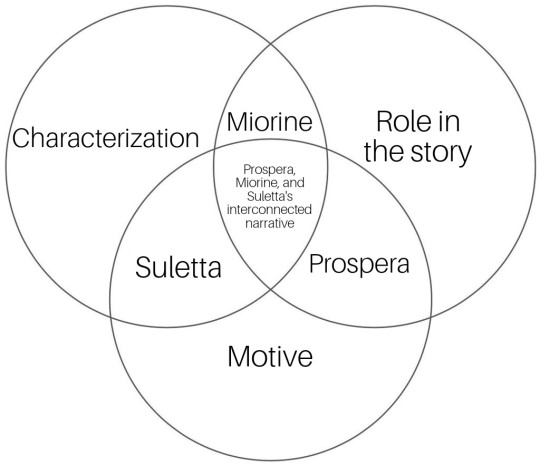
The way these three characters' story gets intertwined starts with Prospera creating a repli-child of Ericht that becomes Suletta to help enact her revenge for the incident at the Vanadis Institute. Skip forward seventeen years where Miorine and Suletta cross path. Then, through Suletta being Suletta, she unwittingly gets the two of them involved. Through her relationship with Suletta, Miorine becomes acquainted with Prospera and learns about the influence she has over her daughter. Miorine, being who she is, of course, is having none of it and villianizes Prospera to the point of only making things worse for herself, which in turn solidifies Prospera’s role in the story. Lastly, learning just how far Suletta can go in order to keep her loved ones safe is what sends Miorine spiraling as she blames Prospera for the things Suletta did.
Prospera, Suletta, and Miorine’s narratives are extremely interconnected, which, for the most part, is a good thing. Having an interpersonal conflict that’s born from conflicting personalities and goals is gonna feel more natural and less contrived than a more situational conflict. It does, though, also mean that if someone wanted to change something in the story of G-Witch that involves these three without changing any other aspect of the characters or story, it’s going to be a bit of a pain. To complicate things further, this already applies when only focusing on Suletta, Miorine, and Prospera’s fundamental dynamic, but these three are a lot more intertwined than that. Each of their roles, characterization, and motive affects at least one other of either their own or one of the others and sometimes both.

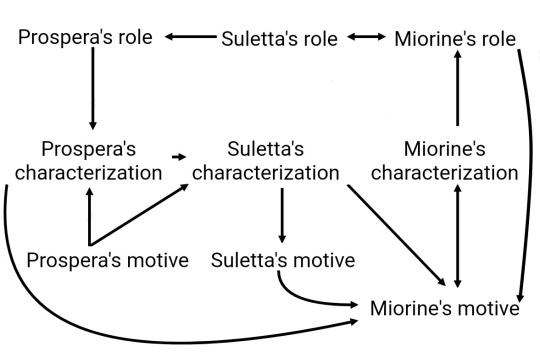
Now, to break this down. Starting with Miorine’s motive, if she’s not set on preventing Suletta from doing something just because her mother told her to, that would affect her characterization. If there’s any other reason she wants to keep Suletta away from Prospera, like actual mind control, that’s going to take away her fundamental insecurity. She needs to be wrong about the level of influence Prospera has over Suletta; otherwise, she isn’t being blinded by her insecurities she would just be right. This makes her a lot less flawed as it presents her deceptiveness as a purely good thing instead of something that every so often turns into mild paranoia. Furthermore, if Miorine either doesn’t have any central insecurity or it doesn’t have anything to do with the rift between her and Suletta, the story ceases to be a romance, which in turn affects all three characters’ roles within the story.
Then there’s Prospera’s characterization, which is directly caused by her lust for vengeance and messes with the minds of both Suletta and Miorine, which is what makes her an effective romance antagonist. Without losing her friends and family, then most significantly, Suletta just wouldn’t exist, and Prospera wouldn’t have treated Suletta the way she did. This, in turn, would change some aspects of Suletta, that is, if she even existed and wouldn’t get Miorine’s, wouldn’t central insecurity get out of control, affecting her motive.
Lastly, there’s Suletta’s characterization. If she was any less unassuming Miorine’s central insecurity wouldn’t be acting up as Suletta wouldn’t do what her mother told her to with question. Also, if Suletta had a more nuanced morality than she does, she wouldn’t have been so unfazed by what she did at Quetta, which leads Miorine to think Prospera has a lot more control over Suletta than Prospera does. Suletta has been taught to think that her mother is always right, so if Prospera tells her that killing someone to keep other people safe is morally correct, she won’t see a problem with turning a guy into meat sauce. Prospera hasn’t allowed Suletta to develop a complex view of morality, which is a lot more messed up than if Suletta was some kind of sleeper agent or the like. Suletta’s unnerving in the same way a young child firing a gun without realizing that people could get hurt is. She is to blame for her actions, but the way she reacts to them is childlike, which showcases the way in which innocence can be terrifying. Suletta being a cinnamon roll doesn't crash with her willingness to kill someone it's why she's fine with it.
So there you have it. Why a character does something changes depending on the situation they do those actions in. This doesn't necessarily have to be a big deal as it mostly affects implications. If the circumstances change but the characters act the same, it can create some narrative dissonance.
#mobile suit gundam the witch from mercury#the witch from mercury#g witch#prospera mercury#suletta mercury#miorine rembran#suletta x miorine#sulemio#posted this on 12 pm UTC to have it actually be sunday for the most amount of people
88 notes
·
View notes
Text
Why Vivienne Needs the Inquisition
No one 'winds up' at Court, my dear. It takes a great deal of effort to arrive there.
–Enchanter Vivienne to the Inquisitor
An ask I received (referring, I think, to something I said in this post, though I've alluded to it at other points as well):
How/why is Vivienne's position at court shakier than it seems? (Please publish this anonymously.)
Thank you for asking! I’ve wanted to write something on this subject for a while, so I appreciate the push to get it all down. It’s something I find really interesting about Vivienne, because it's something she doesn't want the Inquisitor, or anyone, to know, so it's all subtext in the game. Vivienne is a character who always holds the player character at arms' length--a bit less so when she likes them, but there is always some distance there. As such, she's a difficult character to get to know.
And while I do have some issues with the way Vivienne is handled in the game, particularly with narrative and quest design, I won’t be touching on those heavily here. For this post I want to focus on what can be determined about her motivations from the character as written.
Vivienne can be recruited to the Inquisition after the Inquisitor's first trip to Val Royeaux. Notably, she seeks out the Inquisitor's attention herself, inviting them to a gala at the Duke of Ghislain's estate, and also notably, once recruited she will not leave the Inquisition and cannot be forced to leave, no matter how low her approval of the Inquisitor. This is also something I have seen people question: why can't you kick Vivienne out, and why won't she simply leave if she disapproves of your choices? I hope this post will answer that question as well.
The most critical aspect of Vivienne's character to understand, I think, is that she has no stable institutional power. She is not a noble. She has no familial connections of the sort that can help even a mage to keep their head above water. She is a woman who was taken from her family at a young age and raised in an institution, and who has used all her wit and charisma to make the very best of that situation for herself.
Vivienne's position as First Enchanter of Montsimmard is mostly an achievement within the Circle itself. Montsimmard itself, however, was also a stepping stone to influence outside the Circle. Personally, I think the fact that Vivienne declined to join any fraternity when she became a full Enchanter, a shocking move at the time, indicates that she held ambitions outside the Circle from a young age. And Montsimmard was the perfect proving ground for her, a major Orlesian city whose ruling family maintain close relations with the Circle. In The Masked Empire, the Marquise de Montsimmard boasts about dining at the Circle, and she and her husband wear masks adorned with lyrium crystals which we are told were a gift from the First Enchanter. It seems likely, though not confirmed, that this was Vivienne herself.
(Incidentally, it is a real shame that Vivienne’s character seems to have solidified so late in the game’s development, because in retrospect I really feel her absence in the novels. She gets a brief mention in The Masked Empire as Madame de Fer, and absolutely nothing in Asunder, which we'll come back to.)
It seems that the Montsimmard mages were called upon with some regularity to entertain the court, and this is how Vivienne first caught the attention of Duke Bastien in 9:16 Dragon. Within a year, she had moved into a suite in his estate. Her position came under attack for the next few years, but nonetheless, after a single meeting with Empress Celene in 9:20 Dragon, she became the newly-crowned Empress's Court Enchanter.
(Edited to add: It seems to be sometime after this that Vivienne became First Enchanter of Montsimmard, at "an age young enough to cause scandal," though the date is never confirmed that I can find. Incidentally, as @shrovetidecat brought to my attention in the notes, Fiona is also supposed to have been Grand Enchanter of Montsimmard, which given that may be a lore inconsistency, unless Vivienne is only meant to have taken the position after Fiona rose to Grand Enchanter—and I'm not sure why a 40-year-old First Enchanter would be scandalous.)
By the time she meets the Inquisitor, she is likely somewhere in her 40s, and has been the Enchanter to the Imperial Court and the Mistress to the Duke de Ghislain for twenty years. She regularly mingles with the court and has built a practically unprecedented influence for herself in Orlesian high society.
And it's all about to fall apart, for three critical reasons.
First, the obvious: the mage rebellion. One cannot be First Enchanter of a Circle that no longer exists, though Vivienne certainly tries. A majority of mages, even if by a razor-thin margin, have declared that they do not recognize the Circle's authority—and therefore Vivienne's authority as a loyal Enchanter within that system.
I think Vivienne's dialogue with the Inquisitor and her remarks if taken to Redcliffe reveal a deep frustration and resentment of Grand Enchanter Fiona, who called for the vote to leave the Circle and now leads the rebel mages. Vivienne of course handles this in the manner to which she is accustomed, the culture of the Imperial Court, in which trading in verbal jabs and barely-veiled insults is a standard matter of social one-upsmanship. Outside of that environment, she comes across as petty and rude, which is an interesting point of characterization in itself: Vivienne has thrived in the court environment, but she does seem to have a bit of trouble adapting her manner to different circumstances, where that sort of thing might not benefit her. But what she's trying to do is frame herself before the Inquisitor as the reasonable and respectable mage, and Fiona as misguided and pitiable. How well this goes for her, of course, depends on who the Inquisitor is. But the effort itself kind of reveals the shaky ground she's standing on.
In her dialogue with the Inquisitor, Vivienne claims that as the rebel mages follow Fiona, the loyal mages follow her. But where are these loyal mages? There's maybe one or two mages we meet in the game (Enchanter Ellendra comes to mind) who seem to respect Vivienne's word. But if the loyal mages look to her as a leader, why is Ellendra alone in a cave in the Hinterlands to begin with? Why doesn't Vivienne bring a group of these loyal mages with her to Skyhold?
I think it's because Vivienne doesn't truly have followers among the mages, the way Fiona does. This is the story she's telling the Inquisitor, to capitalize on the idea that the rebel position is not a consensus, and also that she still has influence among a significant number of mages. The truth is, she doesn't. She’s spent most of her life courting influence outside the Circle, not in it. She has presided over a Circle where she doesn’t even live day-to-day. I can’t imagine that has particularly endeared her to many of her fellow mages, even the ones who are loyalists or moderates.
Contrast this with Wynne, a pro-Circle Aequitarian who is deeply involved in Circle life despite undertaking sanctioned work outside the tower, and is also deeply involved in the events leading up to the vote for independence. Whatever the Doylist reasons for Vivienne's absense from Asunder, the fact remains: she's just not there. She has no presence in the events leading up to the rebellion. When speaking critically of Fiona's vote, she discusses it in the context of Anders' attack on the Kirkwall Chantry, and says nothing of the circumstances surrounding Fiona's push for a vote—not the revelations about Tranquility, not the conclave (no not that Conclave, the conclave of mages at which Fiona called for the vote for independence), not the subsequent massacre by the templars and the remaining mages' decision to stand and fight. And perhaps most notably, no one mentions Vivienne, positively or negatively, during the events of Asunder. Not once. We are left with the conclusion that Vivienne is simply not heavily involved in Circle politics, no matter what impression she may wish to give the Inquisitor. Her influence does not lie within the Circle.
And I think Vivienne knows this, and realizes that it's suddenly become a big problem for her.
The second big problem is Morrigan.
Vivienne has had the favor of the Empress herself for twenty years. She has, by others' accounts, managed to turn the position of Court Enchanter from "little more than court jester" to a position of influence and respect. And then the Grand Duke attempts a coup, and the Empress's elven lover runs away with a dangerous secret, and suddenly the Empress is enlisting the services of some unwashed swamp witch while Vivienne is standing right there!
Like I cannot overstate what a absolutely galling slap in the face it would be to Vivienne that even as she is attempting to uphold the legitimacy of the Circle and thus of her own authority within it, Celene effectively creates the "Arcane Advisor" position as "Court Mage 2: Apostate Boogaloo" just so she can get advice on non-Circle-approved magics. Advice that Vivienne could not give even if she wanted to, even if the Empress asked, because she has no knowledge of eluvians and ancient elven magic.
Both Dorian and Cole needle Vivienne about her jealousy of Morrigan, and I think quite accurately, no matter how quick Vivienne is to deny it.
Her influence over the Empress is fast eroding. She has been replaced in all but name.
And the third and most personal big problem is Bastien's illness.
Vivienne has enjoyed a romance with one of the empire's most influential nobles for twenty years. She has lived in his home and been on good terms with his wife until her passing. Her influence in the Imperial Court owes a lot to Bastien's affections. Bastien is not only a Duke but a member of the Council of Heralds, the political body responsible for overseeing matters of titles and inheritance in Orlais. They are quite literally the most powerful group in the country; even the Empress rules at their favor, without which she would never have gained the throne in the first place.
And now Bastien is dying, something Vivienne takes care not to mention to the Inquisitor at first. It's not until after the ball at the Winter Palace that Vivienne asks the Inquisitor for help with her potion in a last-ditch attempt to prolong his life—and even then she does not reveal her true purpose until after the Inquisitor has returned with the wyvern's heart. And while it's possible to interpret multiple ways, I personally believe from her response to his death that she did care for Bastien. She didn't need to bring the Inquisitor to his deathbed at all, if she wanted to continue concealing his illness, something she's taken care to do up until that point. It bespeaks a measure of trust that she allows the Inquisitor to see her so—in her grief, as well as in her loss of position.
Because Bastien's death is a terrible loss for Vivienne socially as well as personally. Bastien's son will inherit his estate, and whether Vivienne is allowed to go on living there will be entirely at his discretion. Perhaps he will permit her to stay, but she cannot count upon his grace, nor upon the protection she enjoyed with Bastien any longer; and furthermore if she is allowed to stay, it will be a favor to her, making her beholden rather than granting her greater influence. She won't have the dignity of being Bastien's widow; she is his mistress, and respected as that position may be in the Orlesian court, it gives her no true claim to his family.
Vivienne is about to lose everything she has built for herself.
Without Bastien, without Celene, she will be left with… what? The position of First Enchanter to a Circle that no longer exists? If her own best-case scenario occurs and the rebellion is halted and the Circles are reinstated, then she still loses all the freedom she has gained and is forced to return to a Circle tower herself—a sphere in which, as previously discussed, she holds less influence than she would like the Inquisitor to believe. Even if she remains First Enchanter, it's hard to see this as anything but a massive step down in the social hierarchy, the beginning of a long slide into what the Fade reveals as her greatest fear: irrelevance.
It's a humiliation that Vivienne cannot bear.
This is why she won't leave the Inquisition, no matter how much she may despise the Inquisitor. Vivienne needs the Inquisition far more than she lets on. This even puts the petty low-approval furniture-moving scene into context. Yes, she’s doing it to snub the Inquisitor, but that doesn’t actually gain her anything. I think it’s deeper than that. The Inquisition was Vivienne’s fallback plan, and it’s not going well. The Inquisitor is making her look bad, she is finding no avenue to further advancement here, but she can’t leave. So, her response is to try to reclaim some sense of control over her life, asserting a kind of power she had at Bastien’s estate and was likely denied in the Circle: control over her own space.
Even if Bastien were to live a bit longer, Vivienne really has nowhere higher she can climb in the Imperial Court. She can't become a noble herself. She can't marry Bastien, or any other noble for that matter, because she is a mage. And I'm sure she's highly aware of this fact. Bastien is several years a widower himself; it is not his former marriage that prevents him from marrying her, now. It is her status as a mage which bars her from entering a noble family, legally, socially, politically. That Bastien never seems to have raised the question at all speaks to the fact that no matter how much he may have stuck his neck out for Vivienne, there was a line even he was not interested in crossing.
So where does she have to go from here?
Along comes the nascent Inquisition. Shaking things up. If any organization could rattle the gilded walls of the Chantry, it's this one.
Why not take a stab at the Chantry, at this point? What does she have to lose?
It didn’t really sink in for me for several playthroughs because she isn't wearing cleric's garb, but Bastien's sister Marcelline, who visits Skyhold after his death with Bastien’s son? She's a grand cleric. One of the surviving grand clerics who will decide the next Divine. Vivienne involves the Inquisitor in her plan to save Bastien, a plan she likely knows will fail—but she puts in the effort. She then introduces the Inquisitor to Grand Cleric Marcelline, having told her how the Inquisitor came to her aid. Marcelline expresses gratitude: “Madame de Fer has told us what great trials you faced, trying to save my poor brother’s life.” Bastien’s son Laurent is a powerful ally in his own right, now a member of the Council of Heralds, but also likely the one who will decide whether Vivienne keeps her suite in the Ghislain estate.
And if the conversation goes well, Vivienne tells the Inquisitor that it was "quite the triumph." If the Inquisitor expresses confusion, she patiently explains the influence that both Laurent and Marcelline wield, and that they have now secured the trust of both. If Vivienne becomes Divine, Marcelline’s favor no doubt goes a long way in getting her there.
Of course Vivienne will continue to take a conservative position on the mage question. A mage looking to insinuate herself into the Chantry hierarchy would have to, just as a mage seeking the freedom to consort with the court would have to. In the same way that a Hawke with aspirations of seizing the vacant seat of Kirkwall's Viscount must side with the templars at the end to show the nobility that they represent stability and order, the Chantry's first mage cleric must be pro-Circle, pro-templar, conservative to the bone. Vivienne seems to recognize this as far more important than actually appearing devout. It's also fascinating to me how little she bothers to make any pretense of a personal faith, instead always discussing the Chantry as an important social institution and political body. And this attitude doesn't seem to impede her chances at the Sunburst Throne very much, no more so than being a mage already would.
Vivienne knows exactly what she's doing. She always has.
Vivienne comes to the Inquisition seeking power and influence in the Chantry because her position among the nobility is falling apart. Whether she comes in with the intention to reach for the Sunburst throne itself is debatable, and I personally think it might have been the intent that she does have that ambition but seeks to let the Inquisitor think it was their own idea, though I'm iffy on how successful that is if it was the intent. Nonetheless, I do believe that Vivienne comes to the Inquisition with the intent to seek influence within the Chantry, realizing that the recent upheaval may offer her a unique opportunity to do so. And depending on how closely the Inquisitor aligns with her goals, she may succeed quite dramatically.
References
Codex Entry: Madame de Fer
Talking with Vivienne at Haven and Skyhold
Vivienne's high disapproval scene
After Bastien's death
Banter with Cole
Banter with Dorian
The World of Thedas vol. 2, pp. 235-239 (hardcover edition)
Dragon Age: The Masked Empire, p. 31 (paperback edition)
#vivienne#madame de fer#dragon age meta#dragon age inquisition#the masked empire#asunder#bastien de ghislain#blunders of thedas#ask anne#thedas politics
262 notes
·
View notes
Text
Hello! Here is data on point of view distribution across characters in The Dreamer Trilogy (which I will abbreviate as TD3) as a follow up to my TRC data from last year (viewable here). A rather long-winded discussion of the data, methods notes, and some supplemental figures and tables are under the cut. As it was not possible to include all values and stats in this post (nor in the alt text for image IDs), my spreadsheet can be viewed by clicking here,
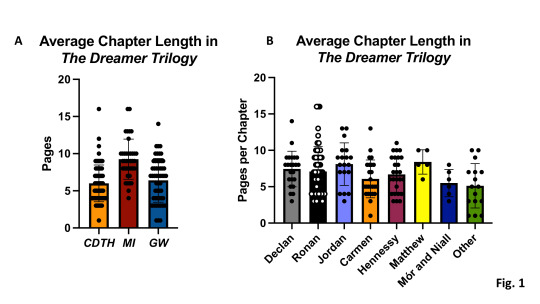
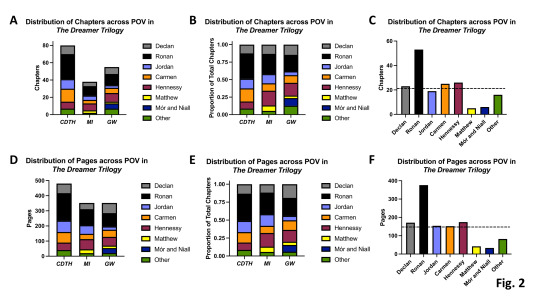


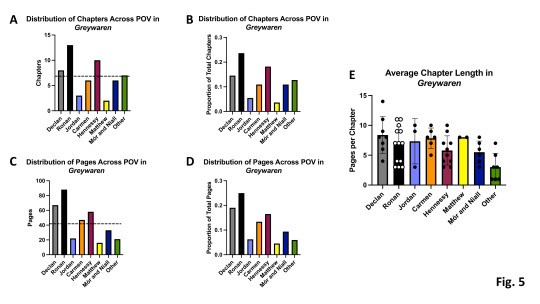
This project quantifies and visualizes the distribution of chapters and pages in the books of TD3 across characters from whose POVs the story is told. I didn’t have much of a hypothesis going into data collection/analysis, especially not like I did for the TRC data, but I did expect to see Ronan’s POV having the most chapters and pages for the entire series, given the fact that he is the most central of the protagonists. I don’t think page time is the be-all-end-all for a character’s importance, of course, but it is still interesting to consider how spending more time from certain perspectives affects the perceived narrative. I won’t get much into that aspect of analysis in this post, but if anybody would actually like to discuss that, I’d love to!
Results (and Interpretation):
TD3 consists of 173 chapters and 1184 pages (using the U.S. hardcover editions), making the average chapter 6.84 pages. The longest chapter is 16 pages, and the shortest is 1 page.
Figure 1A: The average chapter in Mister Impossible (MI) is considerably longer (9.26 pages) than the average chapter in Call Down the Hawk (CDTH) (6.00 pages) and in Greywaren (GW) (6.40 pages), which makes sense as MI has just 38 chapters while CDTH has 80 and GW has 55 (see Fig. 2). To me, the effect of the longer chapters (and therefore extended time with the current POV character) makes the various POVs feel more temporally distant from one another- not in a narratively incoherent way, but in a way that echoes the sense of isolation experienced by dreamers and weaponized by Bryde as he tries to convince Ronan and Hennessy to abandon their loved ones.
Figure 1B: Chapter length is fairly consistent amongst POVs across the series. Matthew has the longest average chapter length (8.40 page) over a small set of chapters (5 total)- his character development (as told from his own POV) is limited to a small number of instances, which may have stretched his chapters a bit longer. The 'Other' category has the shortest average chapter length (5.13 pages) (Fig. 1B); it includes the typically short chapters from witnesses of Visionary explosions/aftermath (Mags, Dabney) as well as Nathan's manifesto excerpts. (As a side note, I've described the chapters depicting memories from the Barns as 'Mór and Niall.' These chapters do not collectively portray an equal balance of their POVs, but this was the simplest way to categorize them.)
Figure 2A-B: These graphs are representations of chapter distribution across POVs in TD3 in terms of chapter count (2A) and proportion of total chapters (2B). Some observed trends include Declan's proportion of total chapters remaining quite constant throughout the series, Ronan's decreasing, Hennessy's proportion of chapters nearly doubling from CDTH to MI (and staying at a similar proportion to MI in GW), and Jordan's proportion following an opposite trend (consistent proportion in CDTH and MI, followed by a more than 50% drop in GW). Carmen's proportion of chapters also declines after CDTH.
Figure 2C: This graph compares total chapters per character POV over the entire series. We can see that the largest proportion of the series is told from Ronan's POV (53 chapters, or 0.306 of all chapters). To put that in perspective, Hennessy has the next highest number of chapters (26, or 0.150 of all chapters), which is just under half the number of Ronan's. If all characters had an equal number of chapters from their POV (including the miscellaneous POVs as one category labeled Other), they would each have 21.6 chapters, represented by the horizontal dashed line; Declan, Jordan, Carmen, and Hennessy all have chapter counts relatively close to this number.
Figure 2D-E: These are representations of page distribution across POVs in TD3 in terms of page count (2D) and proportion of total pages (2E). Trends are similar to those depicted in 2A-B, but 2E does make Declan's increased proportion of page time in GW salient.
Figure 2F: This graph compares total pages per character POV over the entire series. The dashed line shows that if each character (plus the Other category) had equal page time in the series, readers would spend 148 pages with each POV. Again, page data is similar to chapter data, but comparing graphs 2C and 2F gives a clear visual indicator that Jordan's chapters (on average, 8.11 pages) are longer than Carmen's (on average, 6.08 pages), since Carmen has visibly more chapters in 2C yet nearly the same number of pages as Jordan in 2F.
Figure 3: Figure 3 shows distribution of chapters (3A-B) and pages (3C-D) in CDTH, as well as average chapter length for each character POV (3E). An equal distribution of chapters would have been 13.3 per character, and an equal distribution of pages would have been 80.0 per character. The 'Other' category included chapters from the perspectives of Lock, Breck Myrtle, Shawna Wells, Jason Morgenthaler (and Lin Draper, briefly, in the same chapter), Mags Harmonhouse, and Dabney Pitts. Carmen's average chapter length in CDTH (4.67 pages) is the lowest single-book average for character POVs appearing throughout the entire series. (Nathan's average chapter length is just 1.00 [Supplemental Figure 2], yet his POV only appears in GW via his manifesto excerpts, and while I have attributed these chapters to his POV, I interpret the POV as actually ambiguous. As with Kavinsky's text in TDT, it's not absolutely certain if we are reading from the writer or the reader's perspective [although in TDT, due to the lack of Kavinsky POV elsewhere, it's probably the latter]).
Figure 4: Figure 4 shows distribution of chapters (4A-B) and pages (4C-D) in MI, as well as average chapter length for each character POV (4E). An equal distribution of chapters would have been 5.43 per character, and an equal distribution of pages would have been 50.3 per character. The 'Other' category included two chapters, both with what I deemed omniscient narration. Declan had the shortest chapters in MI (8.20 pages), and Jordan had the longest (11.4 pages, the longest average for a character for a single book in this series).
Figure 5: Figure 5 shows distribution of chapters (4A-B) and pages (4C-D) in GW, as well as average chapter length for each character POV (4E). An equal distribution of chapters would have been 6.88 per character, and an equal distribution of pages would have been 44.0 per character. The 'Other' category included Nathan's manifesto excerpts (3 chapters), 1 chapter from Liliana's POV, and 3 other chapters with omniscient narration. While Ronan never has the longest chapters, his chapters are shorter relative to other POVs in Greywaren, perhaps as a result of the way his chapters are written during his time asleep/in the sweetmetal sea. I have not yet investigated whether chapters tend to be longer while characters are awake vs asleep or dreaming, but that's something that could be measured from the existing data in the spreadsheet! There is also a dramatic drop in Jordan's POV time in GW compared to the previous two books, perhaps because of her increased divergence from Hennessy and desire to establish a life that follows her own narrative.
Other findings: A major difference I noted between TRC and TD3 was the lack of split chapters in TD3. In TRC, the data analysis was made slightly complicated by having to account for the fact that a non-negligible number of chapters would make a distinct and discrete switch between POVs partway through. While I did not observe this in TD3, I did encounter more ambiguous/nebulous POVs as I previously mentioned. The increased presence of omniscience in the trilogy, for me, contributed to the increased sense of scale and stakes compared to TRC. This increased continuity amongst POV (not amongst core/recurring POV characters, but amongst groups of characters/communities depicted in the omnisciently narrated chapters) also contributed to a sense of dissolution of barriers and identities, perhaps thematically in line with Ronan's character development and increasingly holistic perspective of both his humanity and otherworldliness (although Ronan is not necessarily featured in these 'boundary-breaking' chapters). I also briefly looked at occurrences of back-to-back chapters from the same POV; this happens most frequently for Ronan in all three books, mainly in CDTH, and sometimes featuring a dreaming chapter directly before an awake chapter (or vice versa) in immediate succession. Declan (MI), Carmen (CDTH), and Jordan (CDTH) all have a pair of back-to-back chapters at some point in the series; Hennessy has 2 (MI, GW).
Conclusions: In all honesty, despite this project being quite fun and fulfilling and of course, worth doing, I do not think I have any particularly insightful conclusions about the data beyond what I've already discussed. Ronan took up the largest share of the chapters and pages as expected, although I am not sure I expected this to be true by such a large margin. I also was surprised that Declan did not have more chapter/page time, but it is possible that his notable inclusion in chapters from other characters' POVs increases his prominence in the series (and I suppose this is probably true for all characters who frequently appear in chapters outside their perspective). As with TRC, the number of POVs expands as the series develops, often with the effect of increasing the scope of the story's implications, and perhaps, more importantly, showing the story from additional angles that contextualize and/or distort narrative established by other characters' perspectives. I hope you've enjoyed exploring the data as I have, and those interested in my methodology may continue reading below!
Methods:
Data collection was straightforward in the sense that I simply counted the pages in each chapter and then assigned each chapter to a character based on the POV represented. The POV character assignment was more difficult than it was for TRC, as TD3 has more omnisciently narrated chapters, which in itself is easy to categorize, but they often zoom in on or are 'biased' towards the experience of a particular character, so I had to make some decisions as to what, for me, constituted sufficient focus on a character’s internal narration and expression vs. omniscience. In the spreadsheet, I took notes on these more subjectively driven decisions. Again, you can view it here! It also contains data on whether the chapter is from an awake or dreaming POV, and has the first lines of each chapter, among which are some fun repeating patterns.
For bar graphs with dots, each dot represents a single chapter. You may also notice that the graphs are missing p-values from statistical tests this time around! This is because, since completing the TRC data, I’ve realized that such measures of uncertainty re: significant differences are not appropriate for my dataset, which is not a sample representing a population, but rather a complete group of chapters (so parametric tests are not necessarily helpful or valid). However, I still like to run the tests for my own amusement and to see what the results would be if this were a dataset for which ANOVA and contingency tests were appropriate, so I have standard deviation bars on the graphs where calculable (but no standard deviations in the text of the results section for legibility) as well as the p-values in tables at the end of this post for anyone also curious. I did still calculate the numbers of chapters and pages that would represent an equal distribution across POV characters, which are represented by the dashed lines on the relevant figures. I think this is helpful to visually gauge 'over-representation' and 'under-representation' of character POVs.
Below are the supplemental figures showing all character POVs rather than lumping some together in an 'other' category. The MI data in figure 4 is not expanded below because the chapters designated as 'other' were omniscient and thus would have remained in the same category.

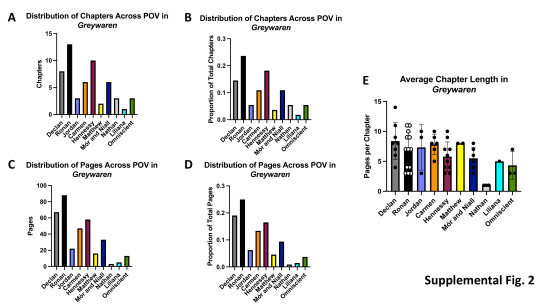
And finally, here are the omitted p-values, if you'd like to pretend along with me that all the chapters in TD3 are not a complete set but rather a representative sample of a greater population of chapters that's out there in the universe. :) When I give a p-value below the 0.05 threshold but still write 'no significant differences amongst any combination of characters, I mean that the p-values generated for the comparisons between each possible pair of characters were all above 0.05, which are distinct from the overall p-value generated from the ANOVA.


#the dreamer trilogy#call down the hawk#mister impossible#greywaren#ronan lynch#declan lynch#jordan hennessy#carmen farooq-lane#long post#rchl#now onto more qualitative/linguistic things! xoxo
102 notes
·
View notes
Text
Why you should give Text Adventure games a try (and how to do so)
There is not nearly enough love for Text Adventure Games here on Tumblr. Or anywhere really. But especially here, I feel like you guys would really get a kick out of them. Here's why:
(quick note, I'm gonna be using the words Text Adventure and Interactive Fiction pretty interchangeably here. Technically that's not perfectly accurate, they are technically different things, but I don't care to explain the difference Just roll with it.)
So
Do you like weird short stories told through unconventional mediums? That's most of what Interactive Fiction is
You like story based video games but hate the finicky combat? Congrats, there is literally no combat skill required beyond the ability to type "hit guard with crowbar"
Blind or visually impaired? Since these games are (with a few exceptions) entirely text based, they work great with a screen reader!
Sick of profit motivated AAA titles with no creative integrity? Well, these games are almost always produced by a single nerd (usually a horrid amalgamation of computer geek and literature geek) with no budget and no responsibilities of the product they're making. And they're usually not paid, since these games are free. Text Adventure is a labour of love, and in most games you can feel the care and effort the creator has put into the game.
Sick of spending $20-70 on a video game? Lucky you, I've been playing TA for years and I have not spent a cent in doing so (Fallen Londen will try to make you pay. But Fallen Londen sucks and is run by bigots. Fuck Fallen London.) Games are either available free on a browser, or as free, small downloadable files (most of which can be played using the Parchment Interpreter)
Wish you read more, but reliant on the quick dopamine of digital media? Well now you can read while also being an active participant in the narrative.
Bad at puzzles? Me too! Games from the 80s and 90s, as well as more famous newer games, have walkthroughs and hints easily available online. Newer games tend to either have a "hint" command, or come with a walkthrough file.
Do you like weird surrealist horror? Well there's... A lot of it.
Okay, but where do I start?
So there are two types of text adventure. The one you might be more accustomed to, and which sees more modern use, is called Hypertext Interactive Fiction. The other is called Parser Interactive Fiction, it's generally seen in older games, as well as games that are larger, feature more puzzles, or involve more exploration.
Hypertext games
Basically, the game will give you a scenario, and then a list of options (hypertext links) to click on to decide what to do next. These are usually more beginner friendly since you don't need to fiddle around with parsers, but personally I find them a bit limiting. Nonetheless, if you're new to Text Adventure, they're a good place to start.
Some of my favourites hypertext games (summaries in green)
My Father's Long, Long Legs is an interactive horror story about family, unease, and loss. Really more of a story than a game, but still good. Very nice use of sound. It does have some visual aspects, so this one might not work with screen readers
Scene Kid Simulator is pretty much what it says on the tin. A cute, nostalgic, coming-of-age slice of life story from the POV of a 2000s scene preteen. Nothing special, but a fun time.
The Uncle Who Works at Nintendo is a strange, unconventional, witty, and heartfelt horror game. Your friend has an uncle who he says works for Nintendo. You're about to meet him, or so he says. A fun and spooky look at childhood, childhood friendships, and childhood lies.
16 Ways to Kill a Vampire at McDonald's is... A joy to play. The name says it all honestly. Witty, charming, tense, engaging, and emotional when it wants to be. I actually found this one through a lucky Tumblr Blaze, which makes sense since this is perfectly suited to Tumblr sensibilities. This one has more puzzle aspects than most hypertext games, but it's still relatively easy and beginner friendly. You're a vampire hunter. It's your night off, and you go to McDonald's. But there's something wrong with the customer sitting beside you...
Toadstools is a game about hunting mushrooms. You have trespassed in a national park and you are wandering blindly through the woods looking for rare fungi. Good luck :)
Parser games
Okay these fuckers are where I really get excited. These games have the classic flashing cursor line where you input text like "go north", "search bookshelf", or "kiss my husband", and the game's rudimentary AI parses your input to decide what happens next. These are my favourites. They really allow you the feeling of exploring the game world, immerse you in the protagonist and the story, using just text on a screen and simple inputs. This does make them considerably more difficult, since a) you need to decide the right way to phrase what you want to do, otherwise it won't work, and b) more possibilities means more chances to mess up and miss things. Unlike video games, your cursor won't light up when you see something important, you'll have to search stuff and work things out on your own But, in my opinion, it is so, so worth it. Summaries in red
The first text adventure game I ever played was One Eye Open. It's an extremely graphic and gory medical horror game (although I would consider it tasteful medical horror, in that it never derives horror from medical procedures, disability, or ooOoHh gross scary sick people) You play as a volunteer test subject for a medical research facility, having to unravel the mystery of the hospital's bloody past. It's good. It's fun. It's tense. It has some really dumb mechanics. Don't play if you're sensitive to descriptions of gore, death, or corpses. This one doesn't have a walkthrough, but I've played it enough times to know the puzzles by heart, DM me if you need help.
Anchorhead is possibly my favourite piece of interactive fiction I've ever played. It's incredible. You play as a newlywed woman, moving to the small seaside town of Anchorhead after your husband Michael inherited a mansion from some distant relatives. There's something wrong with the town though. There's definitely something wrong with your husband's mysterious ancestors. And you're starting to think that there might be something strange happening to Michael. Get ready for some wonderfully atmospheric and immersive Lovecraftian horror, action sequences that are incredibly vibrant for Text Adventure, and a super compelling mystery that the game lets you work out on your own. The puzzles here are hard. I'm not gonna lie, I used a walkthrough at several points during this game. But my god it's worth it. Big massive huge content warning here for mentions of incest, sexual assault, and pedophilia. Not in excess, and nothing explicit, but it will be mentioned as part of the story.
Little Blue Men is a short, strange, sci-fi-ish horror-ish comedy-ish game by the same author as Anchorhead, though the two games are wildly different. You are an office worker. Cope with it. Take The Stanley Parable, Stella Firma, and Hitchhiker's Guide to the Galaxy, mash 'em together, and you have Little Blue Men. It's bizarre. It's evocative. It's pretty darn good.
Coloratura is a strangely beautiful sci-fi story. You're a weird little alien blob. You've been separated from your home and are trapped aboard a human spaceship. You need to get home, need to make the humans understand in the only ways you can: color and song.
Slouching Towards Bedlam is a brilliant little steampunk game about language, choice, cults, Armageddon, and triangles. This game has multiple endings. It's neat in that none of the endings are really "good" or "bad". Rather, you need to decide where you stand, and act in the way you think is best.
The Lurking Horror is the grandparent of horror interactive fiction, released in the late 80s. You're a tech student in university. Something more than electricity is powering the school's computers. Find it, but don't die along the way. Besides the comically archaic descriptions of computers, this game doesn't feel all that dated. It's tricky, puzzle-heavy, and charmingly surreal. (Fun fact, this game and another old TA game called Zork inspired the "darkness kills you" mechanic which would later be popularized in Don't Starve!)
Nine Lives is a very short, very weird, very cartoony game where you play a cat that is very bad at staying alive. Cw for non-graphic but repeated cat death.
Spider and Web is one of the most ingenious uses of Text Adventure as a medium I've ever seen. It's famous for having one of, if not the singular best puzzles in video game history. It's tense, it's fast-paced, it introduces you to mechanics slowly and then lets you test them out on your own. I won't spoil too much, but you play as a very badass spy, reliving your brilliant heist during an interrogation. This game even features a character destined to be a Tumblr Sexyman. It really has it all.
If anyone actually read through all this, and has even considered playing any of these games, I'll be a little surprised. This post turned out a lot longer than I wanted it to be. It was meant to just be "hey interactive fiction is a cool and underappreciated medium, go check it out", but this is my special interest, and not one I often get to talk about. I guess this was me infodumping to the only place that will listen, the empty void of the internet. But these games are fun. And they do not get enough love. Text games are a dying genre, if they're not dead already. Give them a chance, show them some love.
#video games#games#text adventures#interactive fiction#horror#horror games#lovecraftian horror#anchorhead#if#decided not to mention Cragne Manor#because that's a beast all it's own#and it isn't really worth reccomending unless you're already an Anchorhead fan and seasoned IF player#swarm's nonsense#gaming
797 notes
·
View notes
Text
Let's Keep It Simple: Power Dynamics in Milgram
(CWs: Ableism, Abuse, Bullying, Unhealthy Power Dynamics)
(This is partially me putting this post and this post together and partially a more cleanly written version of the ideas discussed in this reblog chain and partially additional thoughts after both.)
(Big thanks to: Tsuwmya, Tired-and-unslimed, Archivalofsins and Clownsalot for contributing to the original chain and making this thing much bigger than it would of been otherwise)
(Also big thanks to: Roseofcards90, 1moremilgramenjoyer, Tsuwmya, Tokyogruel and milgram-side-blog for reading this!)
When talking about heroism and the ideas associated with them, it's easy to focus on the altruistic and selfless aspects of it. The ideal of a brave hero selflessly protecting the innocent is an appealing one.
And there's nothing Inherently wrong with wanting to help people! It's good to help people instead of giving up on them. However, being a hero is an ideal, one that no one could live up to without destroying themselves in the process. And the ideal of heroism practiced by the characters in Milgram isn't fully altruistic.
When you are defining your entire sense of self through heroism, you are incentivized to find (or Create) people who are Weaker than you to Validate that sense of self. It's self-serving in a way, this isn't coming from a genuine want to help but a want to feel in power.
Let's consider Yuno's reaction to her voting in T2.
(Yuno T2 VD)
Yuno: Ah, yes yes. Well, this is going to be purely—purely—personal opinion but…I find those kinds of assumptions preachy and unpleasant! They’re worthless! Arbitrarily deciding that I’m pitiable. Arbitrarily making up a backstory for me. Creating a personally idealized version of me. Creating an acceptable version of me. They really exist, you know, those kinds of people. And in particular, those kinds of people…won’t do anything for me.
When you pity someone you implicitly assume they are weaker than You, and are unable to help themselves in any meaningful way. Not only that but Yuno is upset at the creation of a version of her that is "idealized." A version of her that is the easiest to sympathize and pity.
It's dehumanizing in a way. Yuno is being projected onto like an Object, instead of being treated as a person. Her agency is being removed for the sake of an easier narrative. Something more convenient to the people around her.
This is an idea Yuno is intimately familiar with, as she's been repeatedly selling different versions of herself to different people. She gives a version of herself those people Want from her. Yuno dislikes being pitied and infantilized like this. She chose to do this, whether if it was a bad decision or not is Different from if Yuno has agency. Which she does.
Milgram's saviors tend to fall into this trap. They don't believe the person on the other side has any agency, they don't trust in that person's ability to interact with the world, and they don't trust in that person's judgement. There is a Fundamental Lack of Respect here for the person being saved.
Which leads us to Shidou Kirasaki.
A Cozy Coffin
I have a lot of strong feelings about Shidou. There's a lot about him that remains mysterious and a lot of him I simply do not trust. However something I am sure about is Shidou's lack of care for the people he tries to save and his Unwillingness to change in the face of that.
Shidou Kirasaki's care is self-serving, it reflects in his medical career and it reflects in how he treats the people around him. He even says it himself, he's selfish.
(Aesculapius)
Shidou: Es-kun. I’ve killed a lot of people. Like I previously told you in the interrogation, I’ve killed for selfish reasons as well. So…
And while Shidou is admittedly unreliable as he Wants to be voted unforgiven. T2 Shidou wants to stay innocent, because he's important, more important than anyone else.
That’s right, there’s justice that needs saving
See, indispensable, I’m indispensable
Shidou believes in his own importance, he believes he contributes something useful to the prison.
T1Q1: Why did you choose your current workplace?
Because I thought it'd let me contribute to society.
And while he Is a doctor and Is Important, he tends to dismiss people who he thinks are weaker than him or who contribute Less in his eyes.
If it’s not needed, I’m not interested
“Throw down”, someone’s value
Cannot be the same as another
“Throw down” should choose between superiority or inferiority
There are people who are Inferior and people who are Superior, and he has the ability to choose who is who. But when people who are Inferior do contribute something to him in some way, he diminishes and erases their agency they have because he believes himself to Know Better.
20/06/13
Shidou: I…… I just don’t understand.
If everything about MILGRAM is true…… why did a child like you have to become a murderer? Just imagining what sort of circumstances must have led to that, it makes me so sad……
Amane: ……*sigh*. Is that right.
I don’t think I’m going to get along with you, Shidou-san.
I don’t agree with the fact you refuse to acknowledge that I have my own free will, and that I should be held accountable for my actions, just because I’m a child. I may have only been alive for 12 years, but all the choices I’ve made, even if they weren’t the best ones, were entirely my own.
What point is there in you getting sad when I have no regrets myself?
……please give me back my test. It seems you don’t have the concentration levels required to be my teacher. I’m going to get Kotoko-san to teach me instead.
Shidou: Amane……
I don’t think that’s true. However smart you may be…… you’re still just a child.
While we know for a fact that Amane's actions were influenced by her familial situation, that isn't what Amane is criticizing here. What she Is criticizing is what we did to Yuno in T1. He invented an idealized backstory for Amane without knowing Anything about her except that she's in Milgram with everyone else. And while that is a concern, the choices she made were her Own, independent of whether or not she had a tragic backstory.
But Shidou doesn't Acknowledge that, because acknowledging that there is a level of agency in her actions would complicate the narrative. It be much easier for him to help if it wasn't complicated.
Shidou was a father. He's projecting onto Amane here, and also does the same to Es. He misses his children, but he doesn't treat Amane and Es in a respectful manner. Something that damages his relationship with the both of them.
(Molech)
Shidou: I don’t know what circumstances you face while guarding this prison nor the reason as to why you’re doing it, but I’m sure that it must take a toll on you emotionally as well. So, please do your best. [pats head]
Es: [is shook] I see. Oh, I see now. So, that’s how it is. So, that’s how it’s gonna be. [deep breaths]
Shidou: Hm? Es?
Es: Don’t you dare… pat my head like that! [kicks]
Shidou: [grunts] Please hold on for a second.
Shidou knows Es very little, he's intruding on their personal space here all because their a child that he pities. He's projecting his parental feelings onto them when they Clearly don't want it because he gets something out of it.
However that isn't all, Shidou Kirasaki is a man trapped in the past, unable to move on in any way. He's trapped in this eternal cycle of grief and regret.

He's constantly searching for a past he can't return to, a future that will remain static and unchangeable.
T1Q16: What is the definition of happiness?
A: To be promised an unchanging tomorrow.
You might wonder how this relates to Saviors and for that I need to talk about:
The Girl Prince
It's hard not to talk about saviors in Milgram without mentioning Kotoko. Her story centers around the concept of heroism and what that really means and involves.
Her story covers a lot of what we discussed with Shidou. Kotoko believes herself to be more powerful than the people she considers weaklings, someone who knows better than them and can make the "right" decisions.
Kotoko: From the beginning I’ve never asked for your understanding! My actions, one by one, are bringing earth closer to peace. Useless Weaklings should just shut up and let me protect them!
Kotoko also puts a lot of importance on power and usefulness. As seen above with "useless weaklings," and she also especially values physical power. How else are you supposed to protect people after all?
T1Q4: When did you start learning martial arts?
A: In elementary school, perhaps.
Without enough power, you can't enforce justice and do the right thing, can you?
Kotoko believes in a worldview with a hierarchical power structure, there are people who are Strong Useful People who protect the Weaker Useless People. Which reflects back into the ableism she exhibits with both Haruka and Mikoto.
Kotoko Birthday (12/15/2023)
Kotoko: Fufufu, fufufufufu.
You’re thinking some outrageous things.
To be frank, it’s abnormal.
Kotoko Birthday (12/15/2022)
Kotoko: Hm. The border between the two is getting a lot vaguer.
Your entire existence is a crime. And I will see you’re punished for it.
While this attitude towards disability and mental disorders and illnesses come from how she views the world around her using the lens of strength and power. But that isn't the only thing.
Kotoko isn't as revolutionary as she portrays herself to be. While she believes that the world Needs to change, she still believes in the structures and hierarchies of it. Notably when she interacts with Es she doesn't criticize Milgram's practices, but instead joins up with them and uses Violent Force to keep people in line.
(I would mention something from her T2 VD here if it wasn't spoilers but there's a scene there that I find interesting, again I won't mention it but I do have it in my mind.)
Kotoko is someone who wants to put the Good People in charge and keep the Bad People away. She wants to anoint a "chosen hero," someone who's "good" in her eyes, someone who she can trust and believe in fully to make the "right" decisions. It's a worldview In Favor of keeping things the same, it's just that someone else should be running it.
Kotoko's worldview is notably immature, it's black and white and lacks a lot of nuance. But she's unwilling to change.
Once again, it's Easier to be a savior if the world is simple. There's no nasty complication getting in the way of the fantasy of being a hero. If you keep the world stuck in a static position then it's easier for it to aid in the Fantasy of being a savior.
And again, this behavior doesn't stem from a genuine want to help people, but a need to validate one's own identity, and to feel like they have power over something.
(Task)
Kotoko: Yes. I hate evil. Hurting innocent people with violence, taking away from others, killing people… I hate all this evil behaviour! The law being unable to judge some sins, there's too many of these cases in this world. Having clearly bullied and torturing the weak, but exploiting loopholes in laws, there's so many sinners who still live in such a carefree manner! Even though I want to change this world, I alone only have this much power.
It's important that things don't change, if they do then you'd have to acknowledge that the world is more complicated than they Want it to be. It's important that you will Always be the hero and that there are Always going to people who need saving.
Or, on the flipside, no matter what you do. You will stay the pitied and loved victim forever.
Good Boy Girl
Haruka Sakurai is a character who is Undeniably trapped in the past.
If with one click, and I can reset everything
He wants to become a good boy again, he wants to be given the same attention he was given in the past, and he projects his mother onto Es and Later Muu.
He's idealized the past so much that he's become submerged in it.
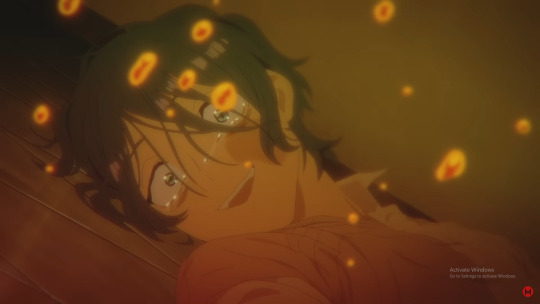
However while Haruka Wants to stay the victim, he wants to stay powerless and pitiful, he really isn't. A tension that often gets played with within his trial. Haruka is able to harm people and threatens Es in Trial 2. First with the idea that he can kill them and then with his life to Guilt Es into forgiving Muu.
I will keep on killing to be a good boy
Haruka Sakurai isn't Weak, but wants to be so he can be loved and adored by the people around him. Because if he isn't perceived as a threat but as someone that can be projected onto without any worry, then he could be loved.
I wanted to be a pitied and loved weakling
However, we do actually have an example of a character who Is Weak, and who is pitied and loved because of that. Who uses her failures and faults to gain power only for it to stumble out of her grasp time and time again because of it.
Muu Kusunoki Fails. A lot. I see a common interpretation of her after It's Not My Fault is Muu as the master manipulator, but if she was she wouldn't be here. She would still be the queen, eating honey like nothing was wrong.
But she isn't anymore, she fell from grace even before she attacked Rei.
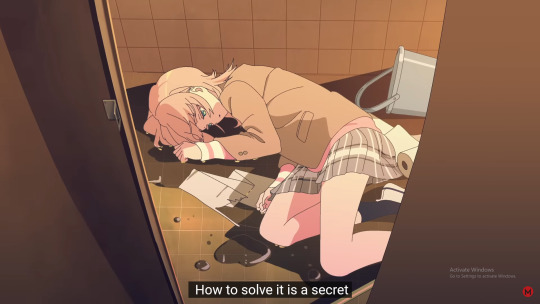
Muu isn't Special, she isn't Powerful. But she is Pitiful, and she uses that pity to gain sympathy and affection from others. Muu Needs to stay the Victim if she wants to be cared for, so she always tries to position herself even when she hurts people.
(Crying B)
Muu: Hey… Prison guard, when you say “I”… Who are you talking about?
Es: [breaking down]
Muu: Prison guard?
Es: [stumbles]
Muu: Prison guard. What’s wrong? Prison guard! [shakes Es] Hey! Prison guard!
Es: Shut up! Don’t touch me!
Muu: [cries] You’re so cruel… I… Even though I was just worried about you… [cries again] I can’t take it anymore. I hate you, prison guard!
If she stays the victim and keeps people's sympathy on her, then she doesn't have to worry at all about people turning on her or hurting her. It's a Service, she acts pitiful, and the people who help her can feel good about doing a Good Thing.
Even if they do eventually turn on her, she can just play victim and hope they stop. Maybe attack their self-esteem as well to really make sure they don't think harder about it.
(Queen B)
M: But if you were like, “I won’t forgive you, Muu! Revenge is bad!,” then wouldn’t that imply that it’s also bad for me to bully someone back after they bullied me? Since we’ve all done something bad anyway, doesn’t that mean that I’ve not done anything wrong in the end?
E: …I think I’m kinda… starting to get your point… maybe…
M: … Warden-san, are you maybe not that intelligent, after all…?
She's using Es' feelings of uncertainty and lack of knowledge to manipulate them into doing what she wants, but she isn't that Good at it. Muu could keep more ground if she continued to play more passive and timid. But instead she acts more aggressive and carefree.
The thing about Muu's strategy is that if She Stops Being Pitiful, it Stops Working. Muu can't let herself be Happy or Confident or otherwise because then she won't be pitiful enough to people. If she does, she gets knocked off her throne and sent back to square one.

Muu is a deeply cyclical character. She cycles from pitiful to queenly and back over and over again. Not only that but when everything is structured through the lens of who's stronger and who's weaker, then you are encouraged to push other people down for your own gain.
Her environment exists as a place where healthy relationships are Discouraged. Because if a relationship doesn't give you anything then you have no use for it.
Muu: Isn’t it exactly because he’s my friend? Isn’t friendship about letting your friends do the things they want? … Are you about to tell me “that’s not what friendship is”? Then what is friendship? You’re together because it’s beneficial for everyone involved, aren’t you?
Conclusion
There's a lot of ways to read these dynamics I think. Tsumi brings up the Karpman's Triangle over here and archivalofsins is working on a post based around TIV. And I can't really put every single facet of a character into this dynamic neatly.
But that's also kinda the point. As stated above, the lack of change and simplicity is important to this dynamic. Its resistant to change and resistant to growth. And any sort of attempt to function outside of it is a threat to it. These mindsets and hierarchies are dangerous because there strict and unchanging, and the deeper your in, the harder it is to get out.

The roles being played here turn people into one dimensional archetypes rather than People. Their motivations, circumstances and personality disappear to fit a convenient narrative of saviors and victims.
It's also much easier to become powerless than to gain power. Muu tried and failed to gain power, while Fuuta was punished and left powerless. It's not a balanced dynamic at all, it lifts up a few people and leaves the rest to rot. But the people who are “stronger” now have to somehow fulfill a role with standards too high to reach. No one wins here, because it's so highly destructive and damaging, and I find the way Milgram interrogates it to be really intriguing.
#milgram#yuno kashiki#shidou kirisaki#muu kusunoki#fuuta kajiyama#kotoko yuzuriha#milgram analysis#milgram meta
98 notes
·
View notes
Text
"Paganism isn't a Burger King or a Chinese buffet, you can't just pick and choose what you want" is bad rhetoric, and here's why.
I recently got an anon message telling me that paganism isn't like a Burger King or a Chinese buffet; you can't just have things your way or pick and choose what you like, and that "everything was organized a certain way for a reason" and that you "change the system at your own risk."
I pointed out that this is an incredibly historically-uninformed take, because there's never been a time or place in history where paganism was pure and unchanging, and there were many reasons for things being the way things were, most of them just not that deep or mysterious. (For example, politics.)
Anon sent a follow-up message stating that they were talking about cultural appropriation, which... strange if true, given that I hadn't been posting anything about appropriation recently.
In fact, it seems that the post this person was responding to was a post about pop culture witchcraft, given that the OP of that post got an anon message with the words "Chinese buffet analogy" and "pop culture paganism" in the same sentence. (It seems this person doesn't understand the difference between witchcraft and paganism. Common beginner mistake, but also, oof.) Said post wasn't encouraging any kind of appropriative behavior, but go off I guess, anon.
In any case, this kind of restaurant rhetoric isn't even good for safeguarding against cultural appropriation. It doesn't actually explain why cultural appropriation is a problem, and functionally just tells people to stay with what they they've been taught and don't question it. If anything, it reminds me of conservative Christian rhetoric telling people that they can't be Christian and pro-LGBTQ+ because "you can't pick and choose which parts of the Bible to follow." (And I think we can all agree that we're better off when Christians decide to ignore this kind of sentiment.)
And speaking of conservative Christianity, people trying to get away from that kind of crap are generally not the kind of people who appreciate being stuck in shitty little boxes and being told they have to follow the rules Or Else. If you use this line on them, sooner or later they'll probably decide that this whole notion of cultural appropriation is a bunch of xenophobic, dogmatic crap, and they're not going to care anymore.
And if it does work on them? If they do internalize it? Congratulations, you've just taught them that policing people's practices for Not Being Pagan Enough is the way to go. This is how you get people harassing each other and putting each other down over total non-issues. It also means that they're less likely to think critically about their own beliefs and practices, and realize that maybe, just maybe, they're actually kinda shitty.
We should be able to explain to people that being mindful of cultural appropriation is about respecting other people's boundaries, access, and general welfare. We should be able to explain the actual harm that cultural appropriation does. Here are some examples:
The high demand for white sage among neopagans has contributed to overharvesting of white sage for commercial sale. This has resulted in ecological damage and made it more difficult for Natives to access the herb.
Ancient astronaut theorists twist and distort myths and traditions from numerous non-white cultures to make it seem as if they support a pseudohistorical narrative in which aliens supposedly built structures such as the Great Pyramids and Puma Punku. This narrative is linked with far right conspiracy theories in general. Those who speak out against the appropriation of their cultures' myths are regarded as unenlightened or agents of the conspiracy.
Commercializing aspects of marginalized culture to sell to the masses is essentially a form of exploitation; large companies benefit while they get nothing. Basically, if you wouldn't support intellectual property theft, you shouldn't support this kind of thing.
Said commercial products typically reinforce harmful stereotypes and misconceptions about said cultures.
In reality, there's no reason why people shouldn't pick and choose what they want provided they are minding boundaries. If somebody wants to worship Freya and Mercury and ignore other Norse and Roman gods, it literally hurts nobody.
There are many things that paganism is not. Paganism is not an unchanging monolith. Paganism is not decreed to us by an infallible authority. "Paganism" genuinely isn't even a very useful term to talk about Europe's rich tapestry of polytheistic beliefs with. But one thing that it is, is up to us, the living practitioners.
110 notes
·
View notes